Latest articles
19.10.2020
Action research workshop for German teachers in Romania organised by the Centrul pentru formarea Continua in Limba Germana (CPD)
Action research workshop for German teachers in Romania organised by the Centrul pentru formarea Continua in Limba Germana (CPD)
Action research carried out by dedicated teachers leads to innovation in classrooms, enhanced teacher efficacy and helps learners to reach their potential.
Until very recently, for many European action researchers, it had always seemed that face-to-face meetings are an absolute necessity to get teachers involved in action research. However, we are currently making new experiences and discoveries.
The CPD Centre for German teachers in Sibiu/Hermannstadt is running a series of training activities on action research based on the ECML project “Action research communities for language teachers” (ARC). The framework for the activities is:
- 90-minute session on action research for German teachers organised by the Centre and held by members of ARC team
- 90-minute session on an innovative didactic approach held by an expert from Germany
- Teachers embark on small action research projects supported by a member of the ARC team at the Centre
- Theme: Moving around in the language classroom - even in times of online learning
- Online presentations of projects by participants
What we are finding out:
- The web-based tools developed by the project www.ecml.at/actionresearch are particularly suitable to be shown online!
- It is necessary to reduce timeslots, which, in turn, means precise preparation.
- Teachers from different parts of the country were surprised by the invitation to participate and grateful for the opportunity.
- It is really important that the communication platform for the events is well-organised and offers the functionality to:
- chat and record the chat;
- allow participants to speak;
- see everyone present during the session;
- show materials through screenshare moving flexibly from PowerPoint to pictures and websites;
- allow work in breakout rooms with easy transfer into breakout rooms and back again to plenary.
*****
German version
Aktionsforschungsworkshop für DeutschlehrerInnen in Rumänien, organisiert vom Centrul pentru Formarea Continua in Limba Germana (CFCLG) / Zentrum für Lehrerfortbildung in deutscher Sprache
Aktionsforschung, die von engagierten LehrerInnen durchgeführt wird, führt zu Innovationen im Klassenzimmer, erhöht die Effizienz der LehrerInnen und hilft den Lernenden, ihr Potenzial auszuschöpfen.
Bis vor kurzem schien es vielen europäischen AktionsforscherInnen, dass persönliche Treffen eine absolute Notwendigkeit sind, um LehrerInnen in die Aktionsforschung einzubeziehen. Zurzeit machen wir jedoch ganz neue Erfahrungen und Entdeckungen.
Das Fortbildungszentrum für Deutschlehrerinnen und -lehrer in Sibiu/Hermannstadt, führt auf der Grundlage des Projekts „Aktionsforschungsnetzwerke für SprachenlehrerInnen“ Fortbildungen zur Aktionsforschung durch.
Es wurde folgender Ablauf geplant:
- 90-minütige Sitzung zur Aktionsforschung für DeutschlehrerInnen, organisiert vom Zentrum und durchgeführt von Mitgliedern des ARC-Teams
- 90-minütige Sitzung über einen innovativen didaktischen Ansatz, unter der Leitung einer Expertin aus Deutschland
- LehrerInnen beginnen mit kleinen Aktionsforschungsprojekten, die von einem Mitglied des ARC-Teams im Zentrum unterstützt werden
- Thema: sich im Sprachunterricht bewegen - auch in Zeiten des Online-Lernens
- Online-Präsentationen von Projekten durch TeilnehmerInnen
Was wir gerade entdecken:
- Die vom Projekt www.ecml.at/actionresearch entwickelten Online-Tools sind für den Online-Einsatz besonders gut geeignet.
- Es ist notwendig, die Zeitfenster zu verkürzen, was wiederum eine präzise Vorbereitung bedeutet.
- Lehrerinnen und Lehrer aus verschiedenen Teilen des Landes waren von der Einladung zur Teilnahme überrascht und dankbar für die Gelegenheit.
- Es ist wichtig,
- dass die Plattform gut organisiert ist und Funktionen auf dem neuesten Stand der Technik bietet;
- dass es eine Chatmöglichkeit gibt und dass der Chat aufgezeichnet werden kann;
- dass man den TeilnehmerInnen das Wort erteilen kann;
- dass man alle während des Treffens sehen kann;
- dass man Materialien durch Teilen des Bildschirmes zeigen kann;
- dass man flexibel von PowerPoint zu Bildern und Webseiten wechseln kann;
- dass Gespräche in den Breakout-Räumen möglich sind, mit reibungslosem Hin- und Herschalten zwischen den Breakout-Räume und dem Plenum.
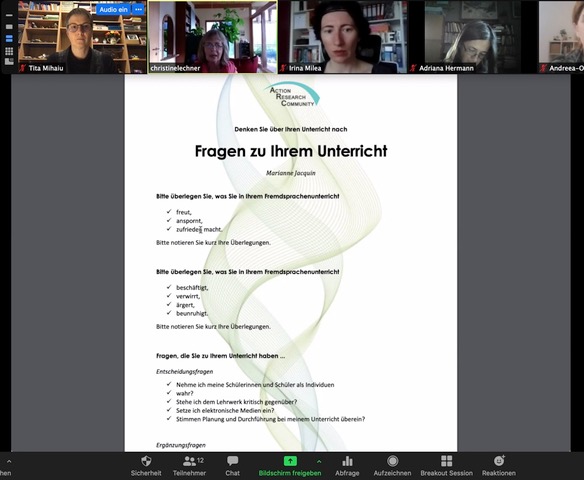
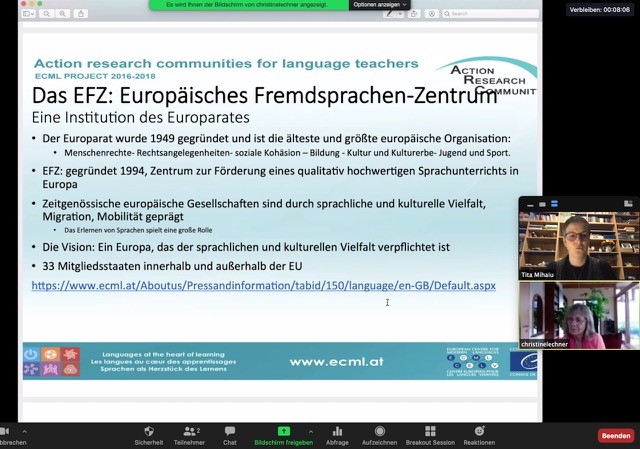
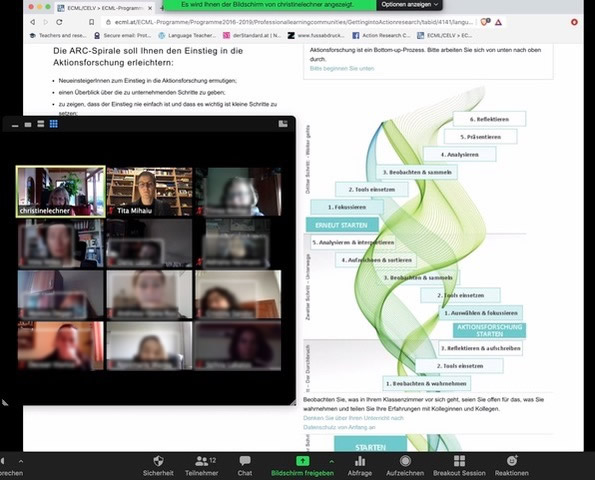
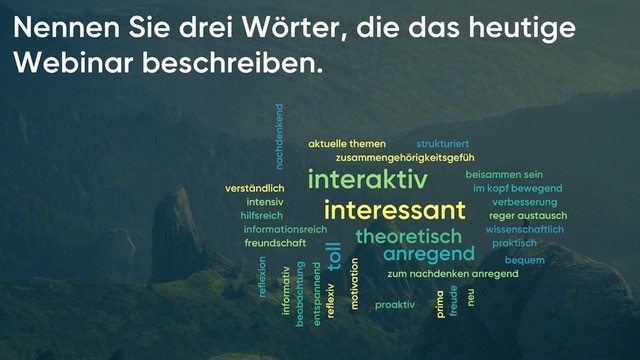
28.09.2020
Action research communities for language teachers: new ECML resource website for teacher development and quality inclusive language education
The European Centre for Modern Languages (ECML) of the Council of Europe is pleased to announce the completion in both English and German of its ARC resource website “Action research communities for language teachers” (www.ecml.at/actionresearch), an output of the ECML programme “Languages at the heart of learning” (2016-2019).
This website offers resources to support language teachers use action research as a tool for the development of reflective classroom practice, taking them step-by-step through the process of engaging in action research in their respective contexts. It also provides materials for teacher educators in initial teacher education.
Given the challenges teachers and learners have faced during lockdown and the challenges ahead as schools across Europe attempt to return to some kind of normality, the need for teachers to reflect on their practice and to benefit from professional learning communities is greater than ever. These new resources can strengthen teacher development and the provision of quality inclusive language education.
*****

Calling all teachers and teacher educators!
|
|
Are you a pre-service teacher who is interested in learning about action research and its benefits for your future teaching practice?
Are you a teacher at primary, secondary or tertiary education level who would like to develop reflective classroom practice by linking professional networks, academic expertise and good practice in your language classroom, and thereby to enhance the quality of your teaching?
Are you looking for impulses to engage in action research and a step by step reference tool which helps set out on your action research journey?
Are you a teacher educator or a training provider looking for ways to develop teachers’ professional skills in this area and for training materials which can be used in a flexible way?
If so, this new open-access resource website, developed in English and German through expert cooperation in the field of language education across geographic Europe and beyond, is most definitely for you.
|
|
Action research communities for language teachers
www.ecml.at/actionresearch

|
|
Click on the links below to go directly to the different resources:

|
05.02.2019
ECML project "Action research communities for language teachers": webinar recording available on the project website
The European Centre for Modern Languages project “Action research communities for language teachers” (ARC) has supported teachers in European classrooms in using action research as an essential tool for the development of reflective classroom practice - highlighting ways in which teachers can enhance their self-confidence and professionalism. The webinar (available on the project website and on YouTube) which took place on 25 January 2019 provides an insight into the experiences gathered over the 3 years of the project (2016-2018) and the results achieved.
The goal of ARC has been to contribute towards quality enhancement in the language classroom through the application of action research approaches by tapping into existing networks with a view to creating new learning communities, which can be replicated across ECML member states.
Over the three years of the project, the team was able to strengthen professional networks by linking academic expertise on action research and good practice in the language classroom. The project has also designed a set of resources for teachers who would like to get into action research and also for teacher educators running courses on action research.
In the webinar the project team and colleagues involved in action research (as listed below) speak about their experiences with action research in national contexts, the resources they developed and addressed questions raised by participants:
- Christine Lechner, Pedagogical University, Austria, ARC - project framework
- Angela Gallagher-Brett: SOAS, University of London, UK - "The ARC-Spiral"
- Inge Alfredson: Avedoere Lower Secondary School, Denmark, "The discovery of the intercultural dimension in English lessons through action research"
- Kenan Dikilitas: Bahçeşehir University Turkey, "Action Research at tertiary level: Field notes from a research mentor"
- Sunny Lau, Bishop's University, Canada. Participatory action research: Promotion of language teachers’ self-efficacy and advocacy for socially just plurilingual pedagogy.
22.01.2019
Just published: The European Language Gazette no. 45 (January 2019)
The ECML's e-newsletter The European Language Gazette provides up-to-date news about the ECML, its partners, as well as relevant sectors of the Council of Europe. It also focuses on national developments in the field of language education in the member states and beyond.
This issue is devoted to the Call for proposals for the ECML 2020-2023 programme "Inspiring innovation in language education: changing contexts, evolving competences" and the ECML webinar on "Action research communities for language teachers" which will be held on 25 January, 16:00-17:30.
17.01.2019
"Action research communities for language teachers" webinar: Friday 25 January, 16:00-17:30 (CET)
Target audience:
- Language teachers
- Teacher educators
- Action researchers
Registration: the webinar is now closed for registration as the maximum number of participants has now been reached
Language: The webinar will be in English.
The European Centre for Modern Languages project “Action research communities for language teachers” (ARC) has supported teachers in European classrooms in using action research as an essential tool for the development of reflective classroom practice - highlighting ways in which teachers can enhance their self-confidence and professionalism. The 90-minute webinar will provide an insight into the experiences gathered over the 3 years of the project (2016-18) and the present the results achieved.
The goal of ARC has been to contribute towards quality enhancement in the language classroom through the application of action research approaches by tapping into existing networks with a view to creating new learning communities, which can be replicated across ECML member states.
Over the three years of the project, the team was able to strengthen professional networks by linking academic expertise on action research and good practice in the language classroom. The project has also designed a set of resources for teachers who would like to get into action research and also for teacher educators running courses on action research.
In the webinar the project team and colleagues involved in action research will speak about their experiences with action research
- Christine Lechner, Pedagogical University, Austria: "ARC - project framework"
- Angela Gallagher-Brett: SOAS, University of London, UK: "The ARC-Spiral"
- Inge Alfredson: Avedoere Lower Secondary School, Denmark: "The discovery of the intercultural dimension in English lessons through action research"
- Kenan Dikilitas: Bahçeşehir University Turkey, "Action Research at tertiary level: Field notes from a research mentor"
- Sunny Lau, Bishop's University, Canada: "Participatory action research: Promotion of language teachers’ self-efficacy and advocacy for socially just plurilingual pedagogy"
During the webinar, attendees will have the opportunity to familiarize themselves with the content and some resources produced by the ARC project, to hear about action research from the perspectives of different educational and national contexts and to join in via a chat.
15.10.2018
ECML project "Action research communities for language teachers": opening keynote at the 1st international Conference of the Swiss Association for Foreign Language Teaching and Learning
At the beginning of September, Christine Lechner and Marianne Jacquin had the opportunity to present the ARC project as the opening keynote at the first international Conference held by the Association en didactique des langues étrangères en Suisse (ADLES) in Lausanne.
The conference brought together university lecturers in language teacher education from Switzerland and Germany and local teachers from different school levels. The thematic range of work presented in workshops was extremely broad.
The opportunity to open the conference with a talk on action research meant that we were able to demonstrate to a large audience how action research can contribute to the enhancement of language teaching, to show how action research functions in practice both at university and school level and to give insights into the work of the ARC project.
*****
- ECML project website "Action research communities for language teachers" (2016-2019):
English - German
The project team:
Christine Lechner (project coordinator, Austria), Angela Gallagher-Brett (United Kingdom),
Tita Mihaiu (Romania), Brynhildur Anna Ragnarsdóttir (Iceland)
27.08.2018
Action research communities for language teachers (ARC): Spring and summer dissemination
During the first half of 2018 the ARC-Team have had different opportunities to disseminate and discuss the project internationally.
Bielefeld, Germany
In January Marianne Jacquin, Christine Lechner and Renata Zanin held a presentation at the 6th CARN DACH (Collaborated Action Research Network in German-speaking countries) Symposium in Bielefeld.
The main focus of this presentation was to demonstrate to an action research community how language teachers in different settings across the ECML countries can take first steps towards action research together. We presented some of the projects developed by participants of the ARC Workshop in November 2016 showing successes and challenges. It was the challenges that have led the project team to the development of the tools to “get teachers” into action research. The next CARN DACH meeting is to be held in Innsbruck in January 2019.
Hong Kong
In early March Christine Lechner held a talk at the Hong Kong Education University on Action Research in Initial Teacher Education & Continuing Professional Development in Austria and further Council of Europe countries. (Abstract)
Participants were lecturers and students at the HKIED, well informed about Lesson and Learning study approaches but less acquainted with further European action research practices. The talk focussed on the role and implications of action research at schools, in initial teacher education and Continuing Professional Development (CPD) in Europe and specifically on the ARC project showing examples from network participants and also the project tools as being currently developed.

Narva (Estonia)
In March Renata Zanin presented the project at the International Research Workshop on Multilingual Education at European Borderlands (15 March 2018, Tartu University, Narva College, Narva Estonia). (Programme)
The paper presented the ARC project aims in general and in detail the pre-spiral for action research communities designed by the ARC-research team to support teachers in projecting and carrying out action research projects in their language classes with teachers of their school or of schools within their region in detail
The audience were lecturers and students from the University of Tartu, Narva College and language teachers of schools, as well as lecturers from other European Universities. They all showed great interest in the ARC-pre-spiral and in the project as a whole.
Liverpool, United Kingdom
In June Angela Gallagher-Brett presented on ARC at the Innovative Language Learning and Teaching Conference at the University of Liverpool (InnoConf 18 book of abstracts). This presentation focused on the importance of collaborative action research for language teacher empowerment and development. Angela demonstrated examples of projects developed by ARC participants and discussed the challenges experienced as well as the successes. She also explained the tools under development and highlighted the Action Research Spiral.
The audience were higher education language lecturers and tutors from UK universities who expressed considerable interest in the project tools and there has already been follow-up from the University of Liverpool where an action research training day for staff is now being planned.
- Project website "Action research communities for language teachers" (2016-2019):
English - German
The project team:
Christine Lechner (project coordinator, Austria), Angela Gallagher-Brett (United Kingdom),
Tita Mihaiu (Romania), Brynhildur Anna Ragnarsdóttir (Iceland)
19.06.2018
Action research communities for language teachers (ARC): national support event in Iceland
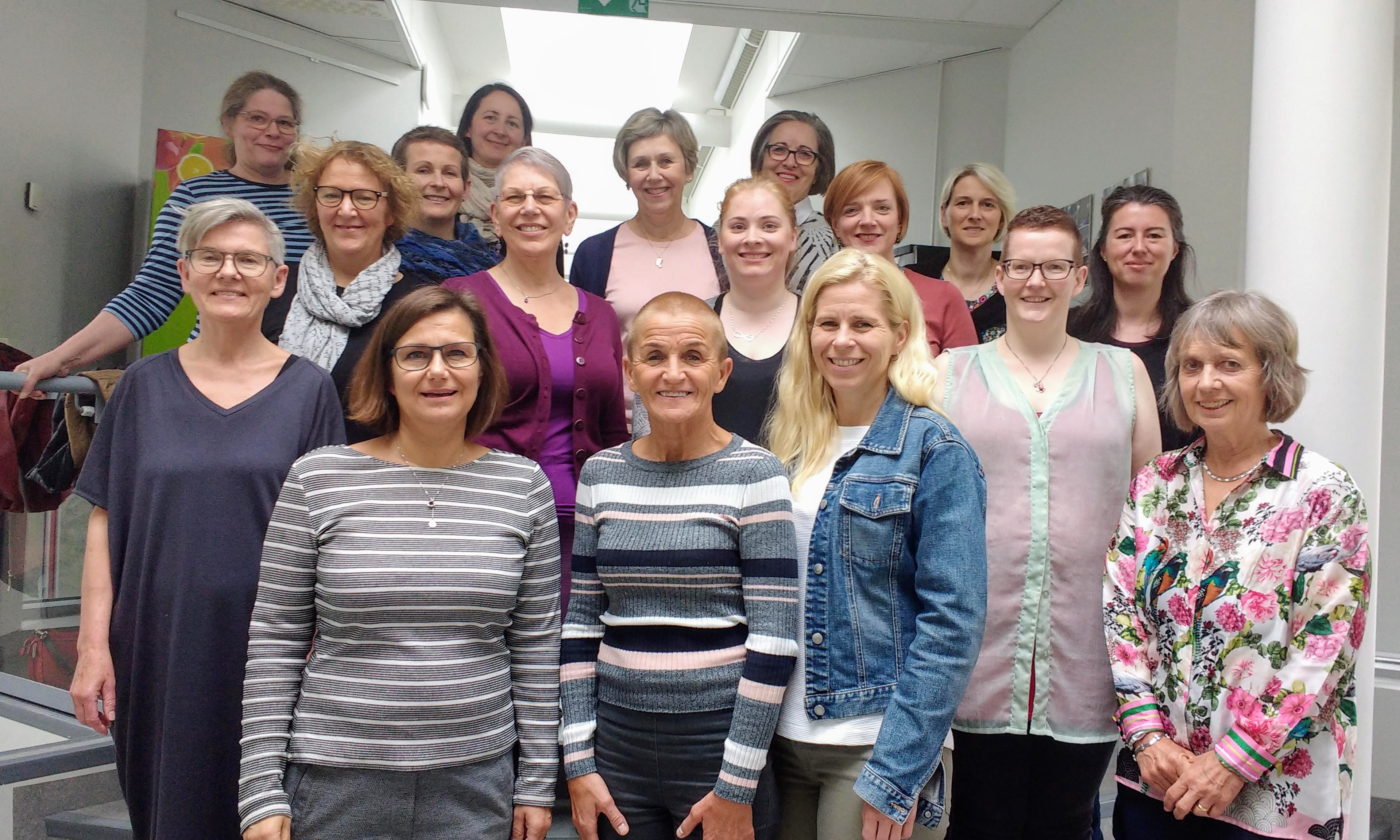 The ARC team held a workshop in Reykjavík for Upper Secondary teachers of Danish, English, French, German, Norwegian and Icelandic as an L2 on 7-8 June 2018.
The ARC team held a workshop in Reykjavík for Upper Secondary teachers of Danish, English, French, German, Norwegian and Icelandic as an L2 on 7-8 June 2018.
The workshop was organised by the Icelandic partner, Brynhildur Anna Ragnarsdottír, and the providers were Anita Konrad, Christine Lechner and Melanie Steiner from the Pedagogical University Tirol, Austria, and Tita Mihiau from the Centrul pentru formarea Continua in Limba Germana in Sibiu/Hermannstadt, Romania. The workshop was furthermore supported by local speakers, Dr. Hafdís Ingvarsdóttir and Hulda Karen Daníelsdóttír.
The aim was to deliver a worthwhile workshop on action research leading teachers to first action research steps whilst focussing on lesson planning on a specific theme. The theme chosen in accordance with dynamic CEFR developments was intercultural learning. Thus, besides an introduction to action research and information about the ARC project, there was an open session showing exemplary didactic materials on intercultural themes embedded in language learning.
During the final part of the workshop, participants worked on planning teaching units focussing on intercultural learning working in groups whereby some grouped according to the languages they teach and others collaborated across languages. As a second step, participants planned a mini-action research project corresponding to the first stage of the ARC spiral.
- Project website "Action research communities for language teachers" (2016-2019):
English - German
The project team:
Christine Lechner (project coordinator, Austria),
Angela Gallagher-Brett (United Kingdom),
Tita Mihaiu (Romania), Brynhildur Anna Ragnarsdóttir (Iceland)
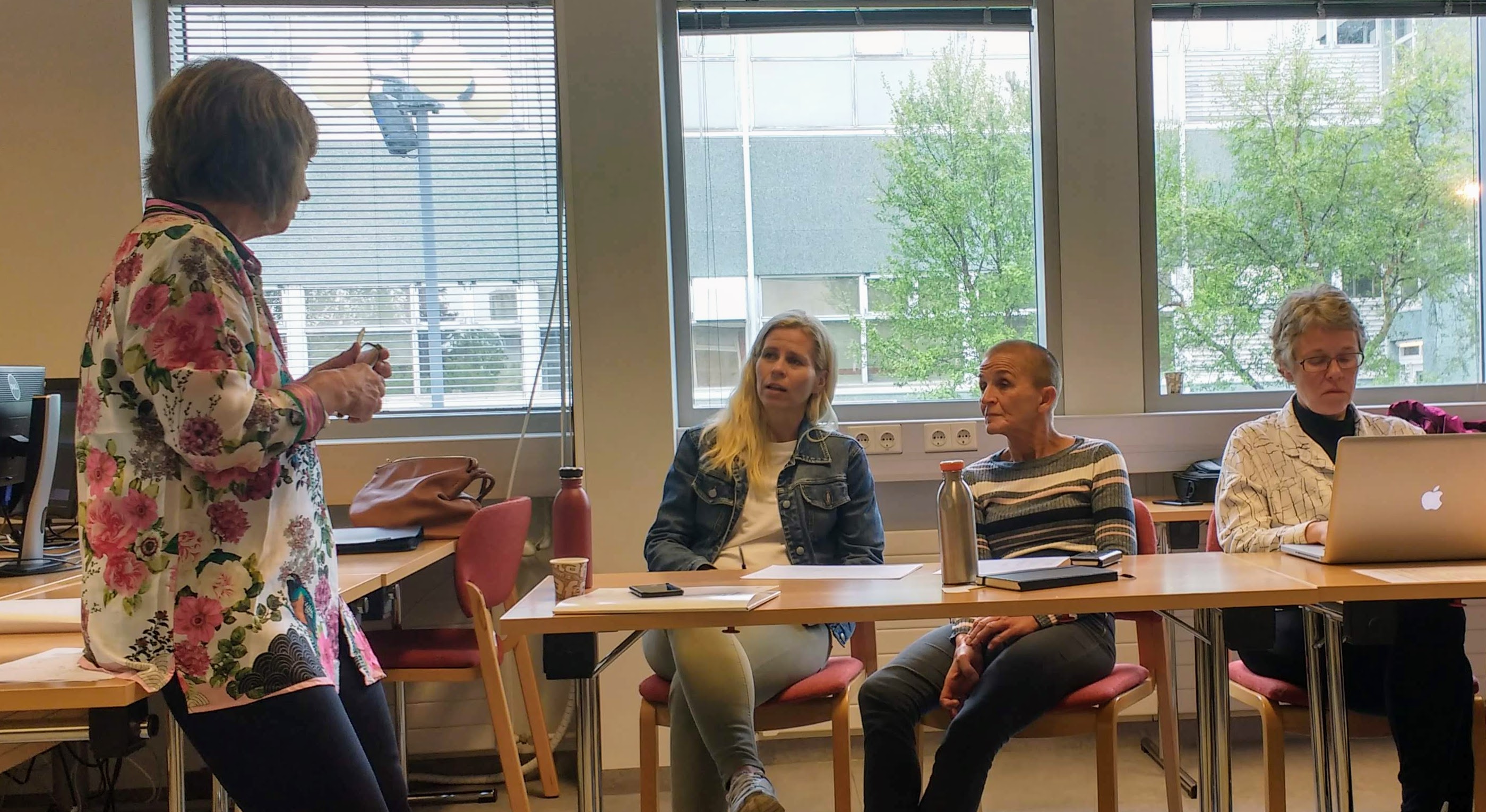
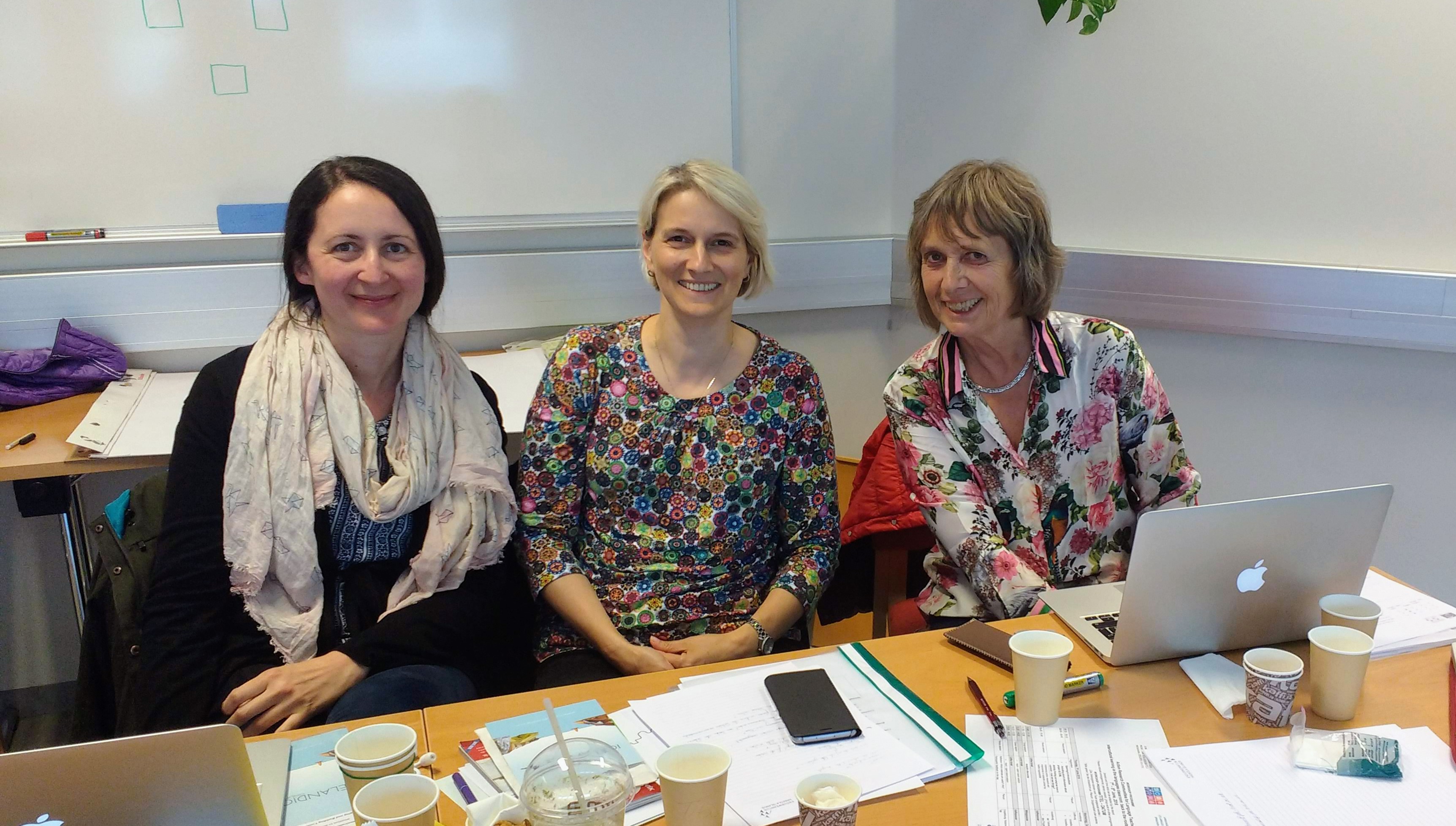
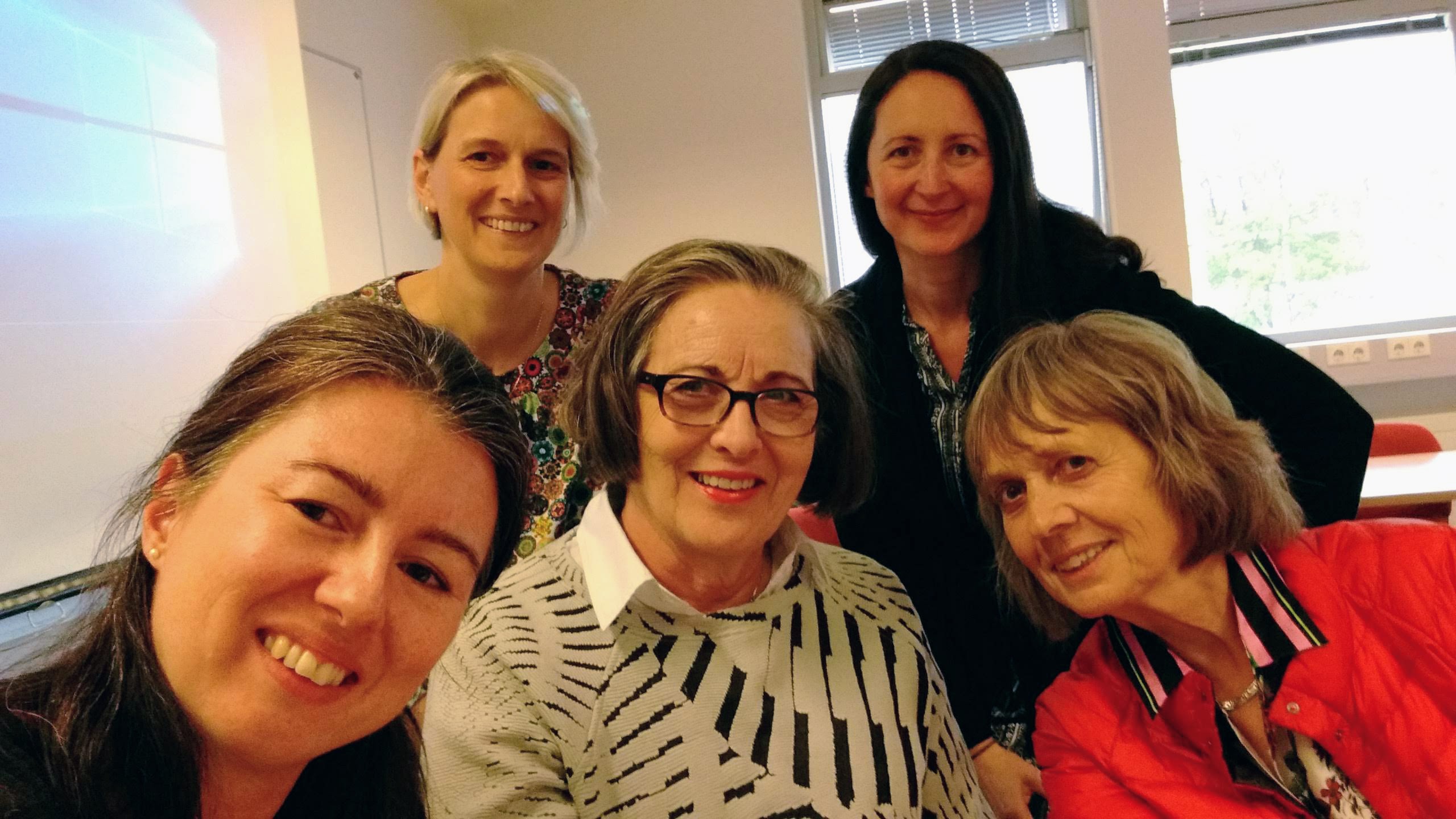
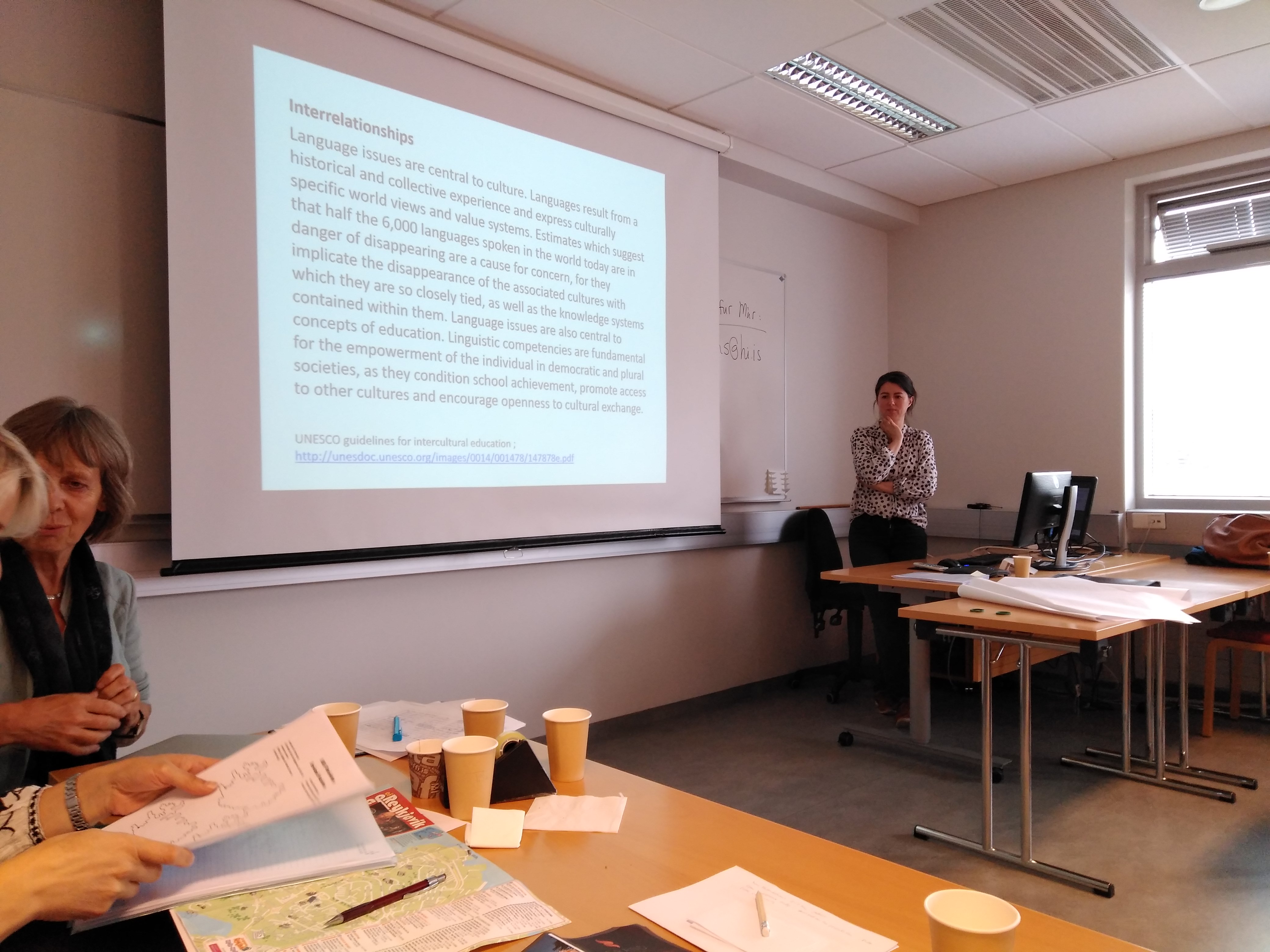
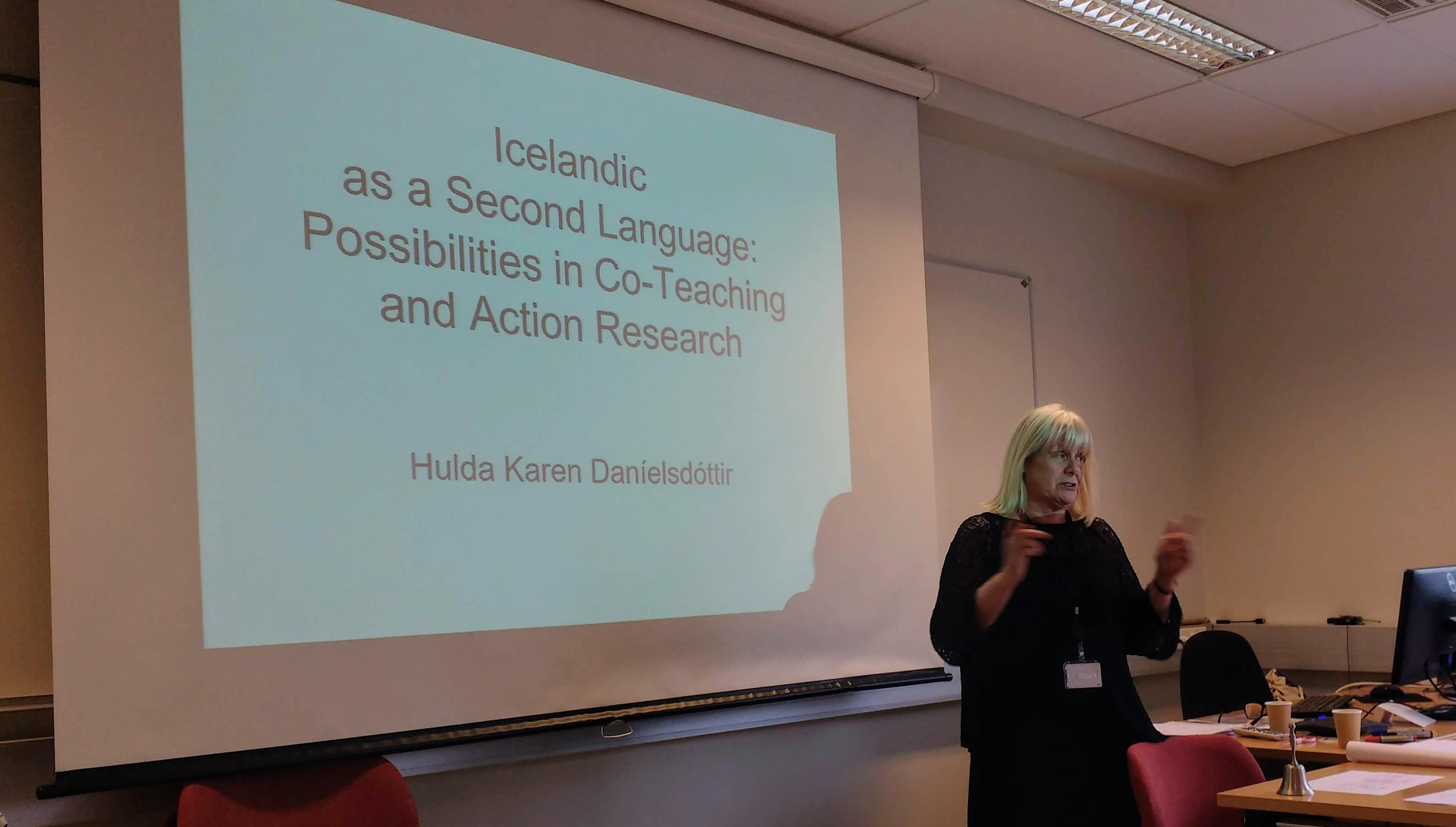
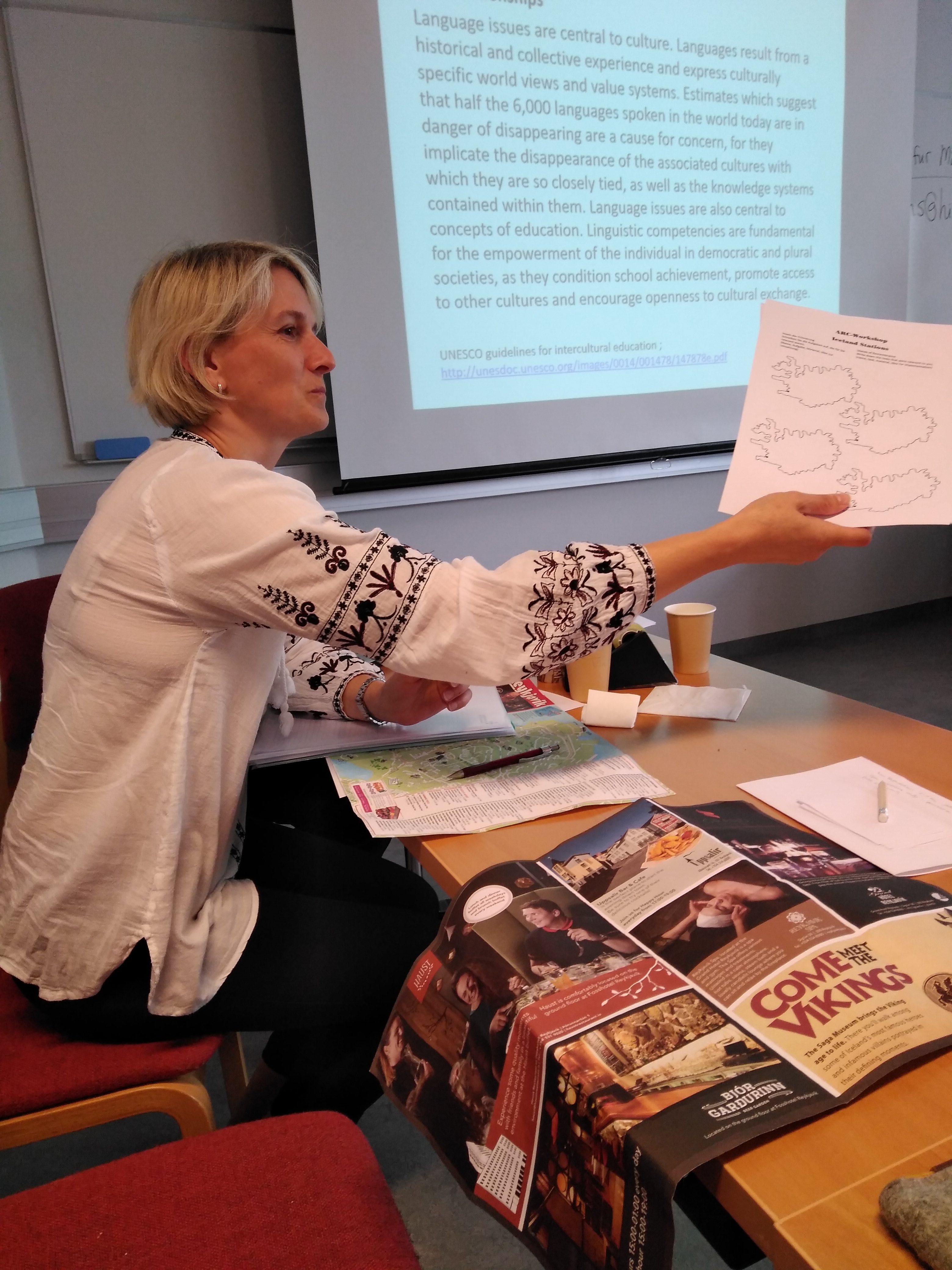
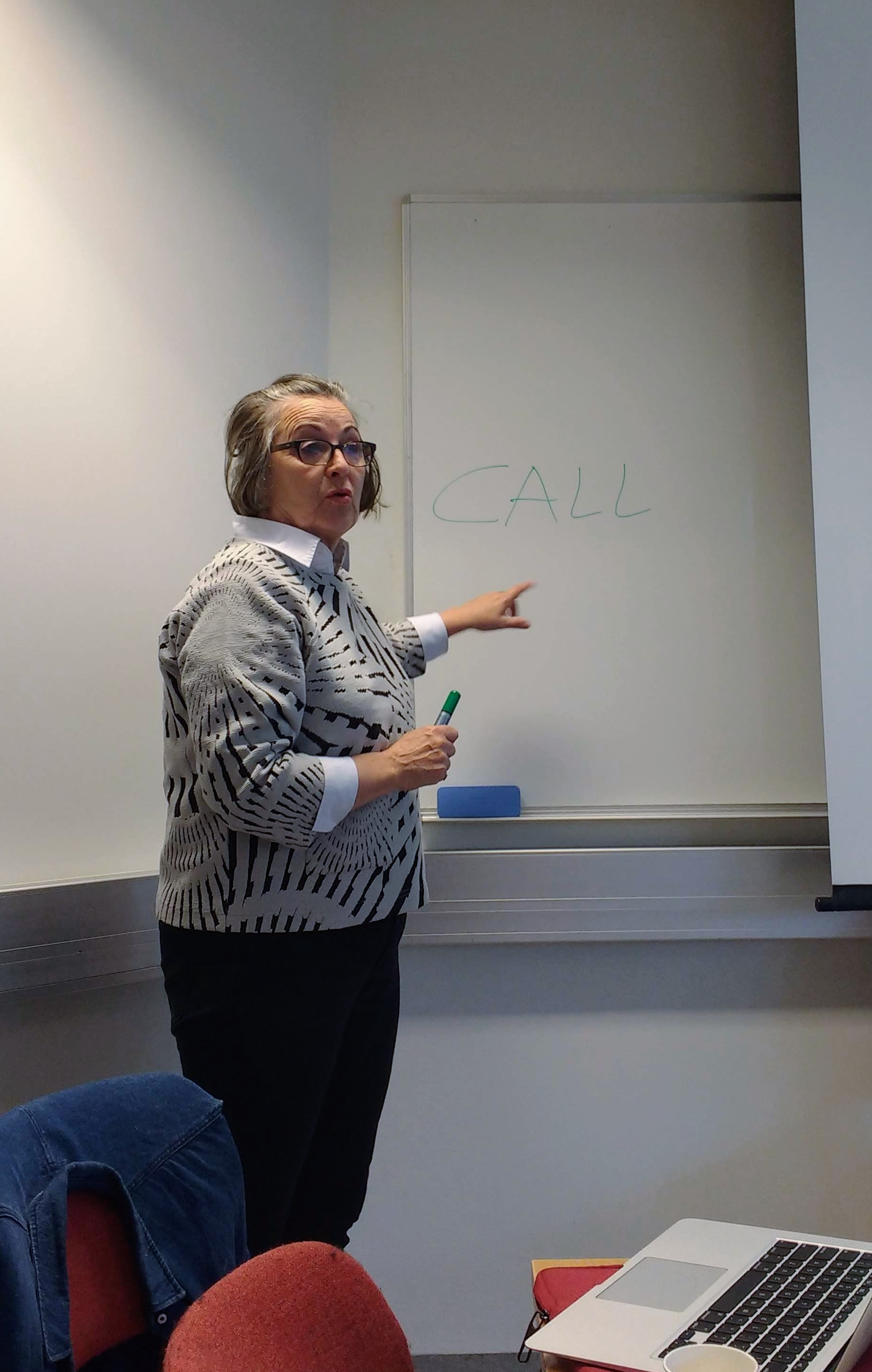
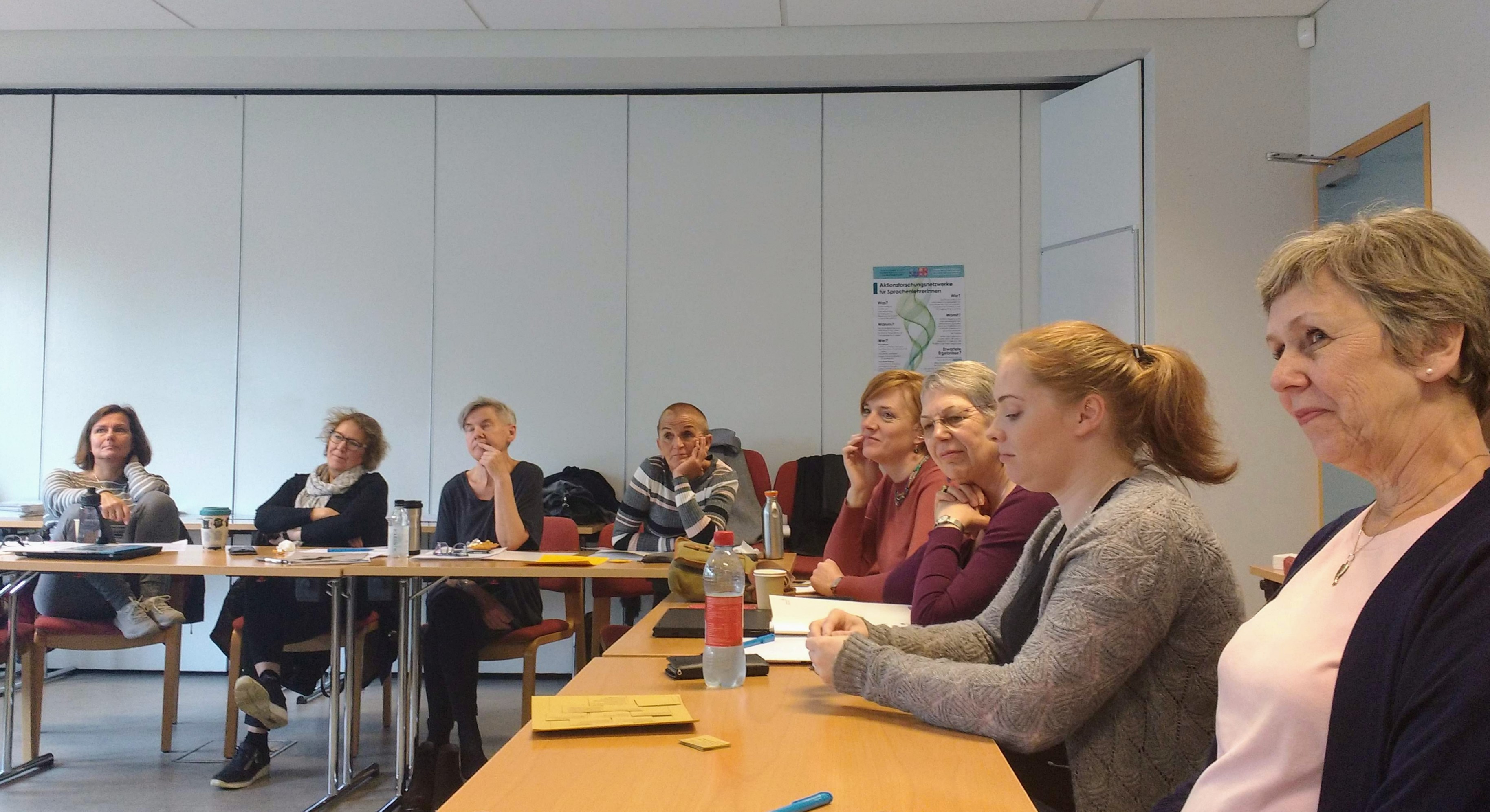
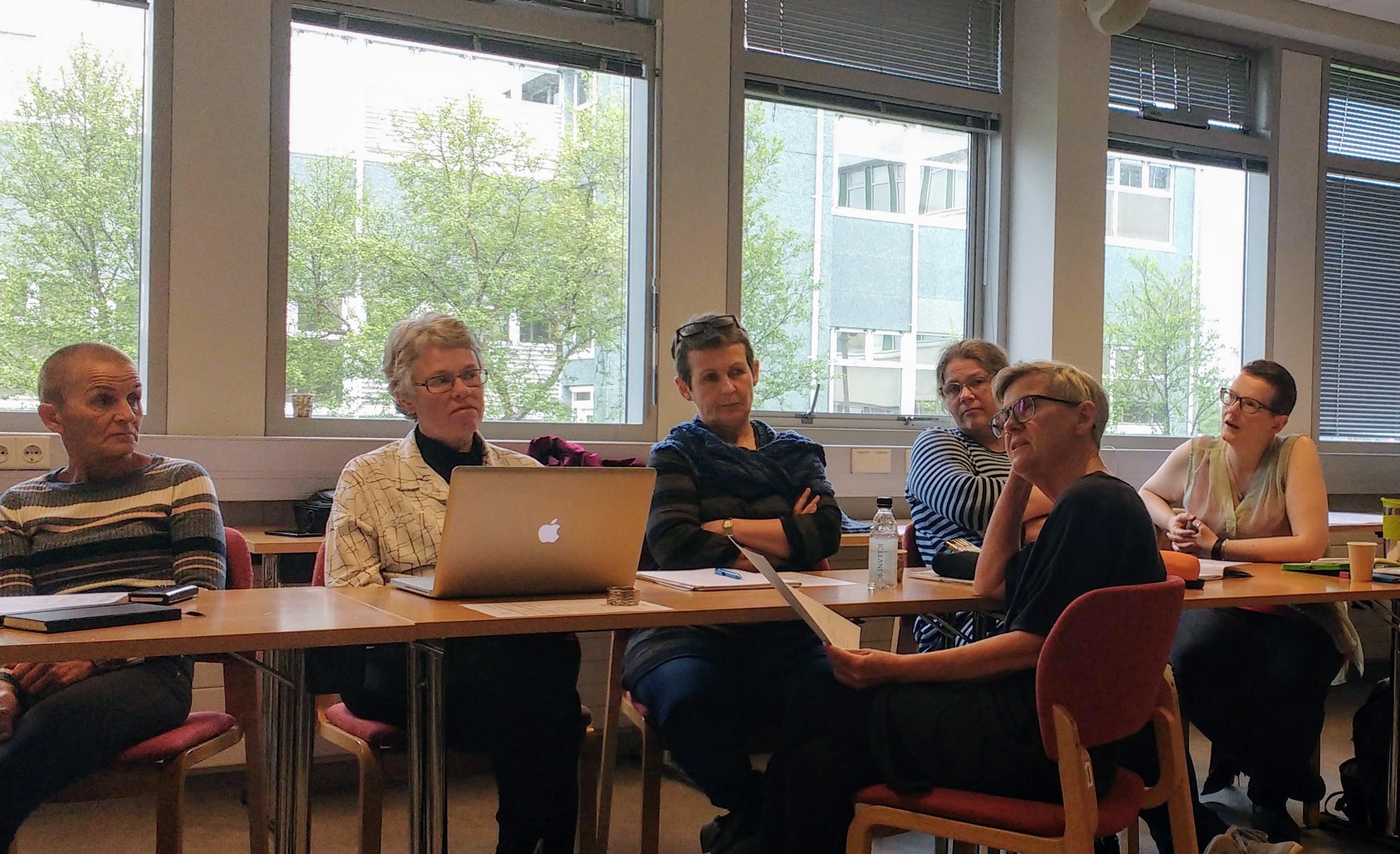

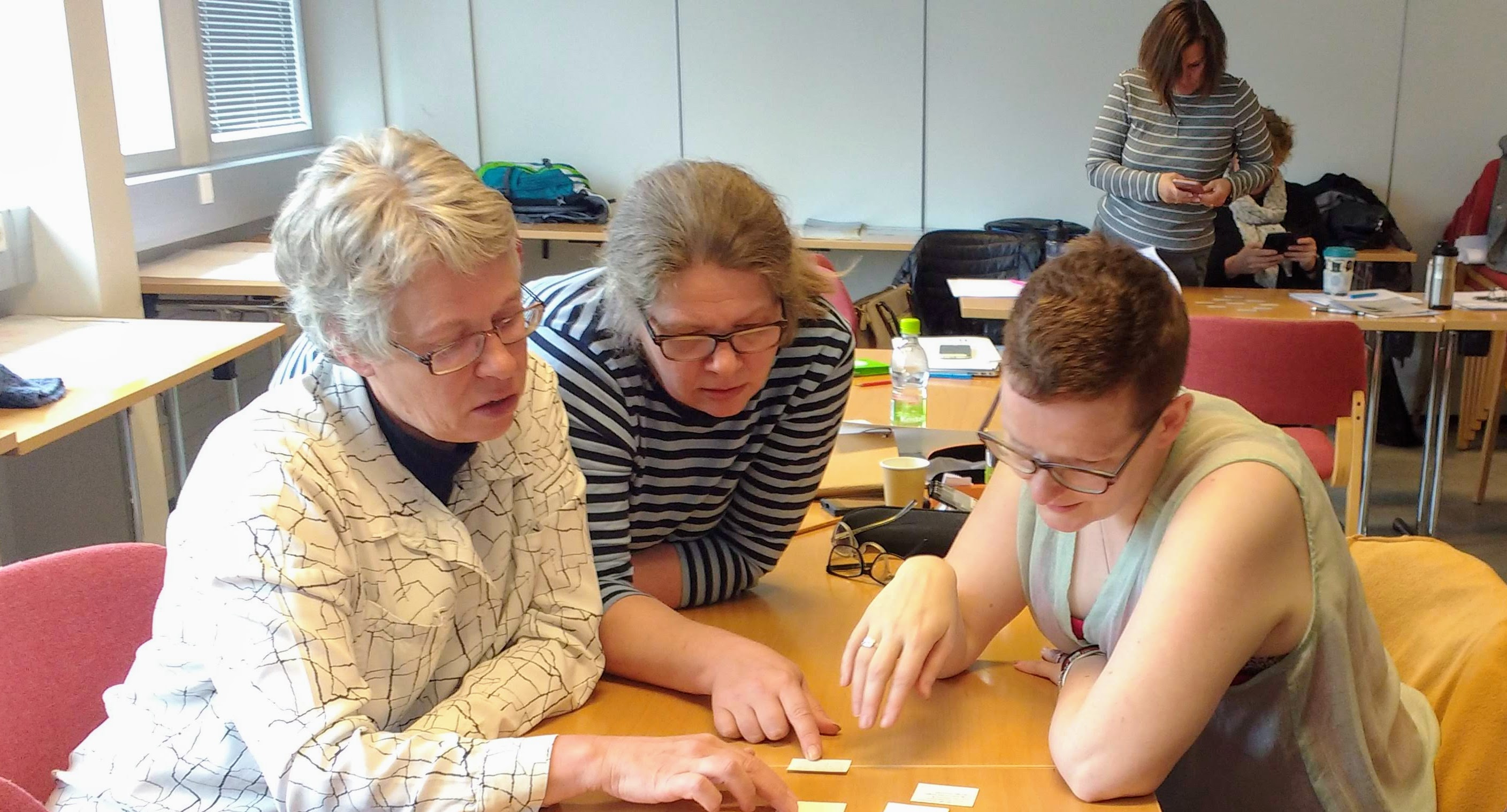

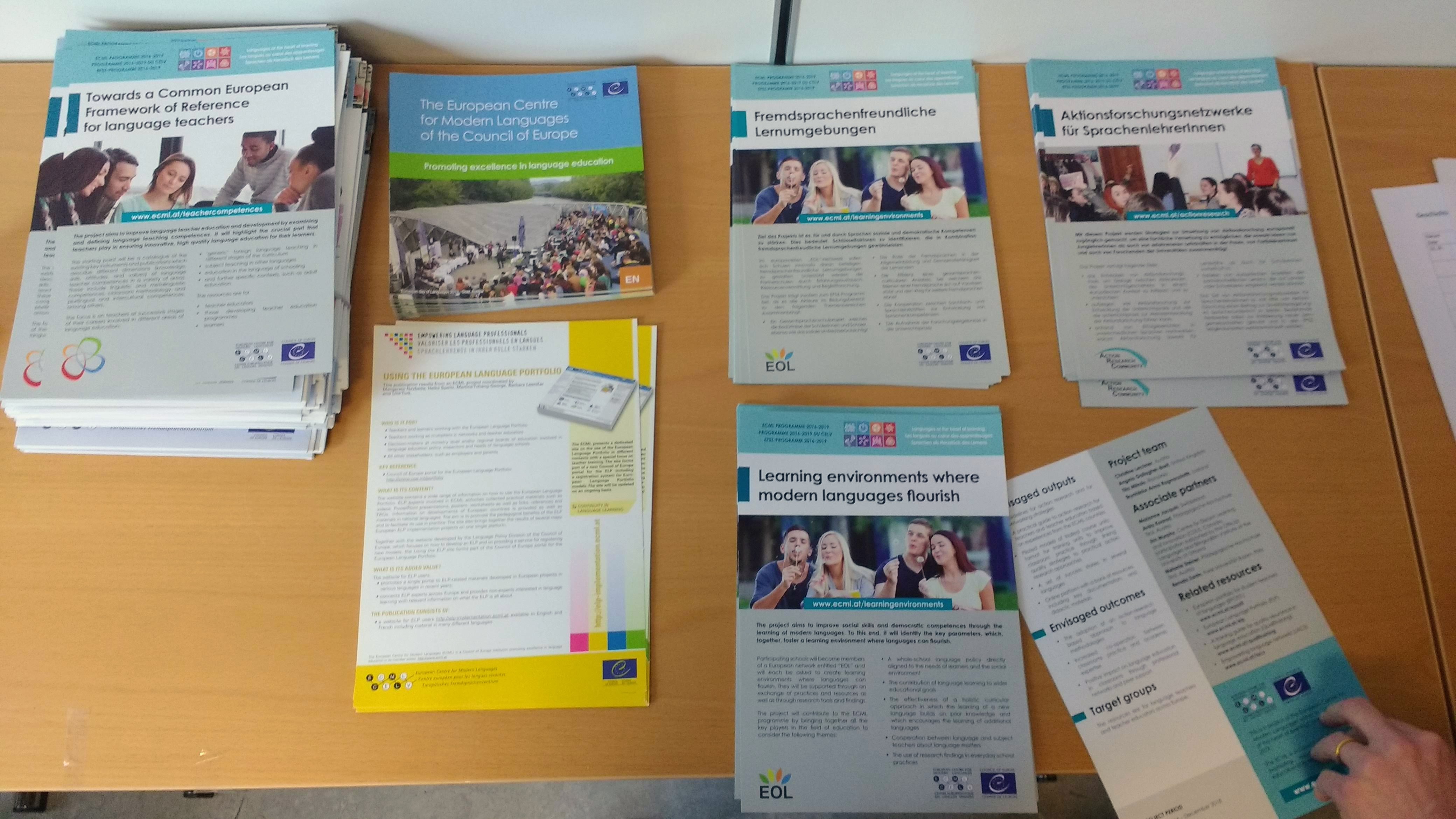
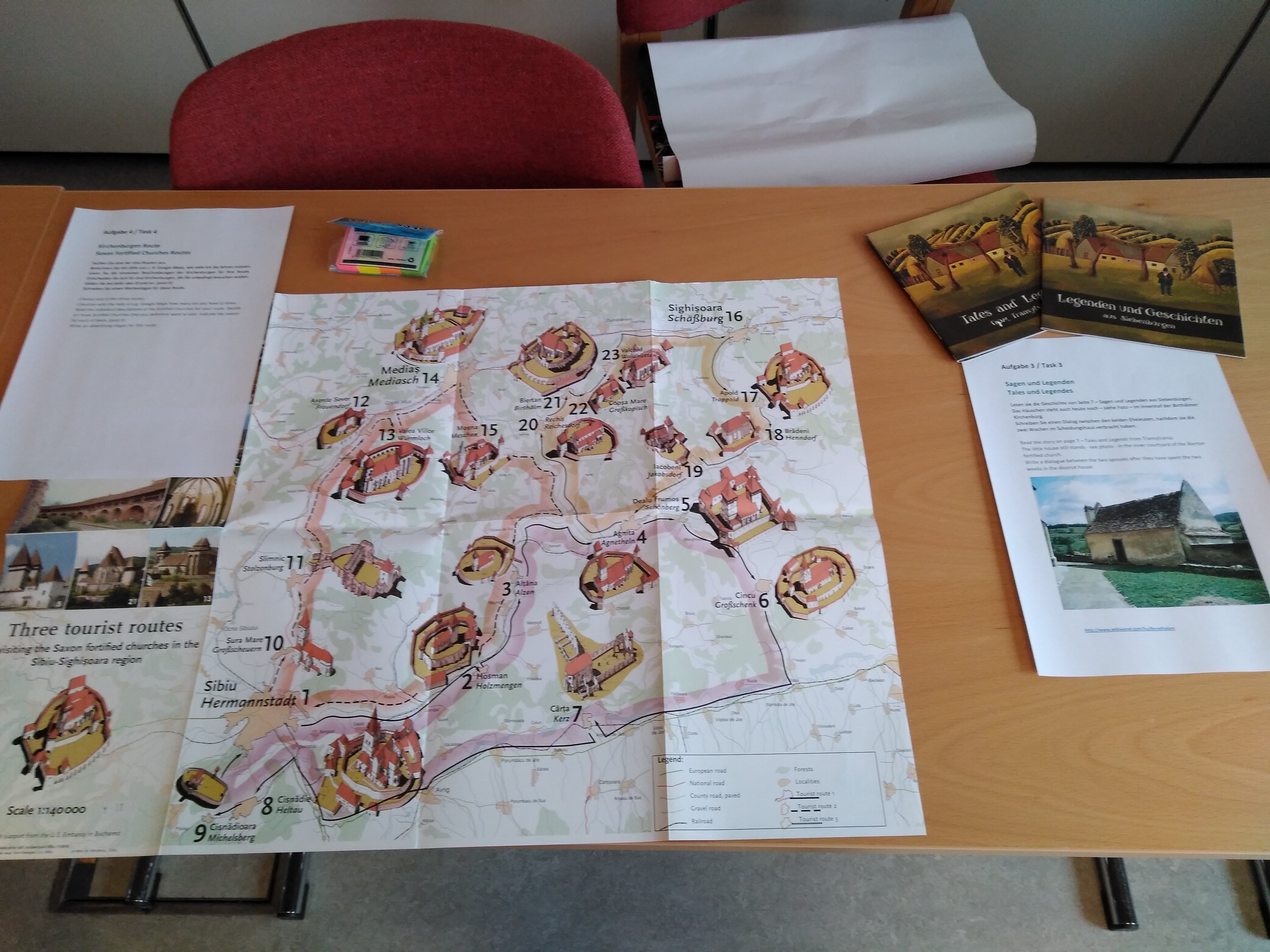
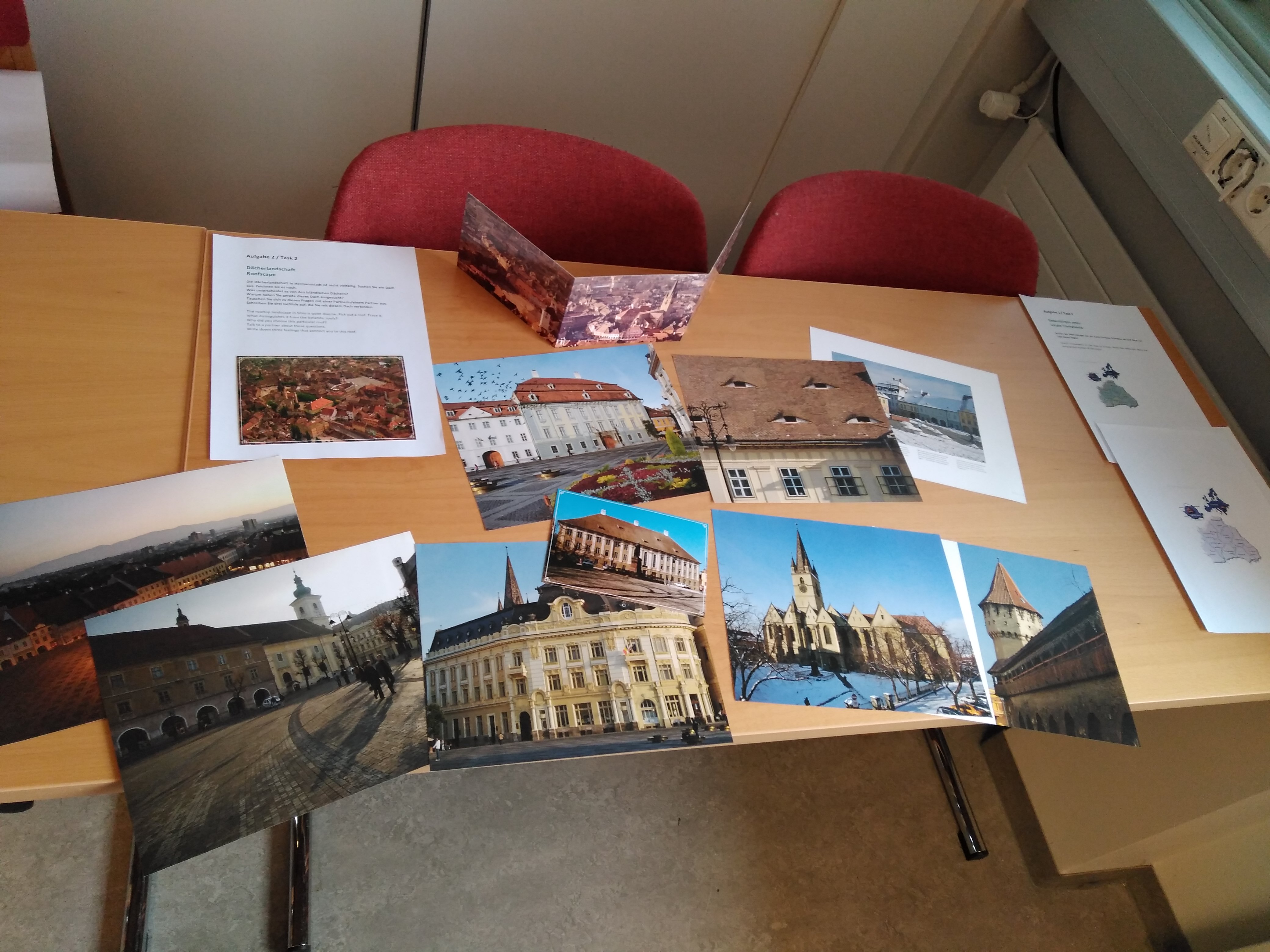
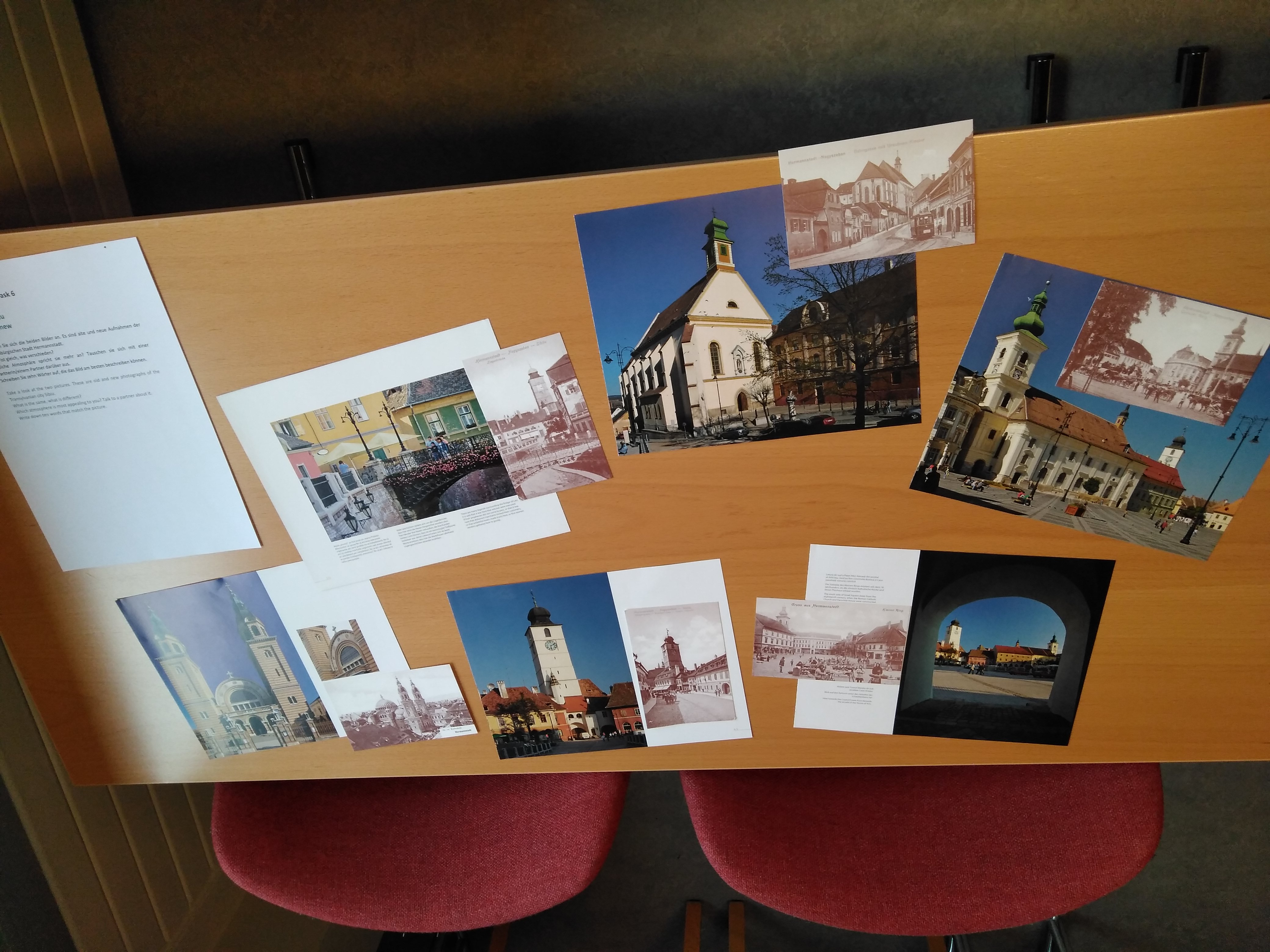
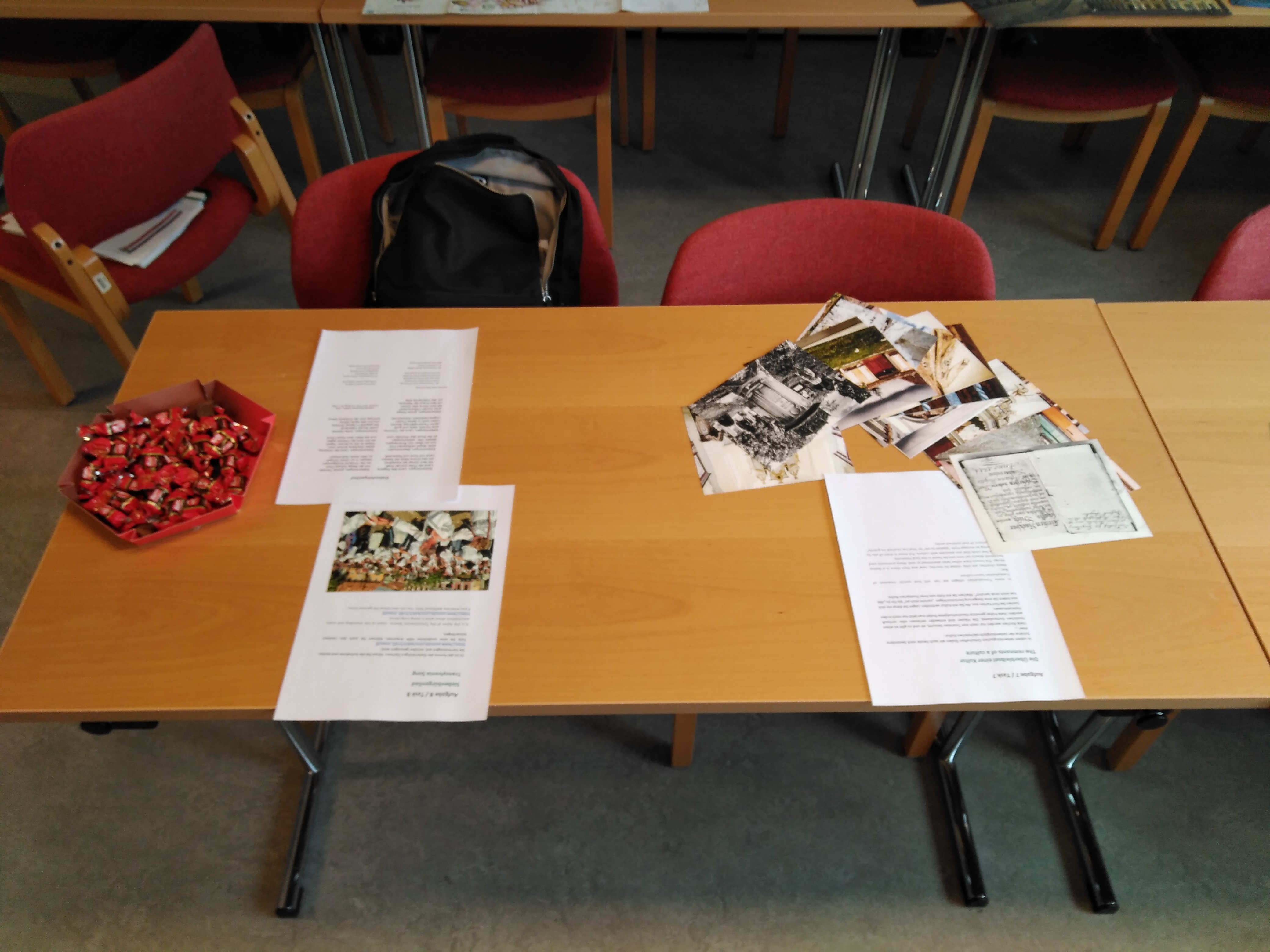


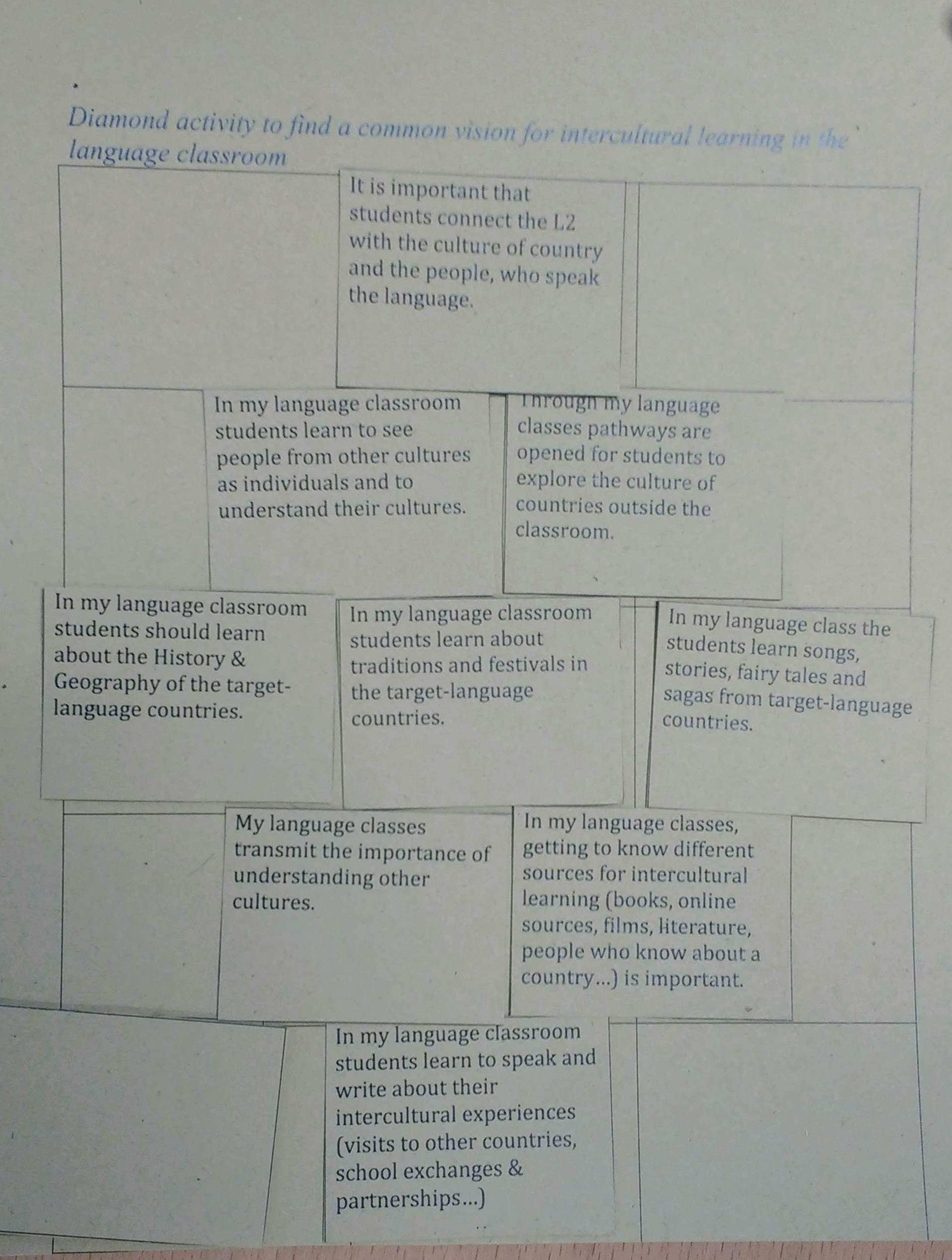





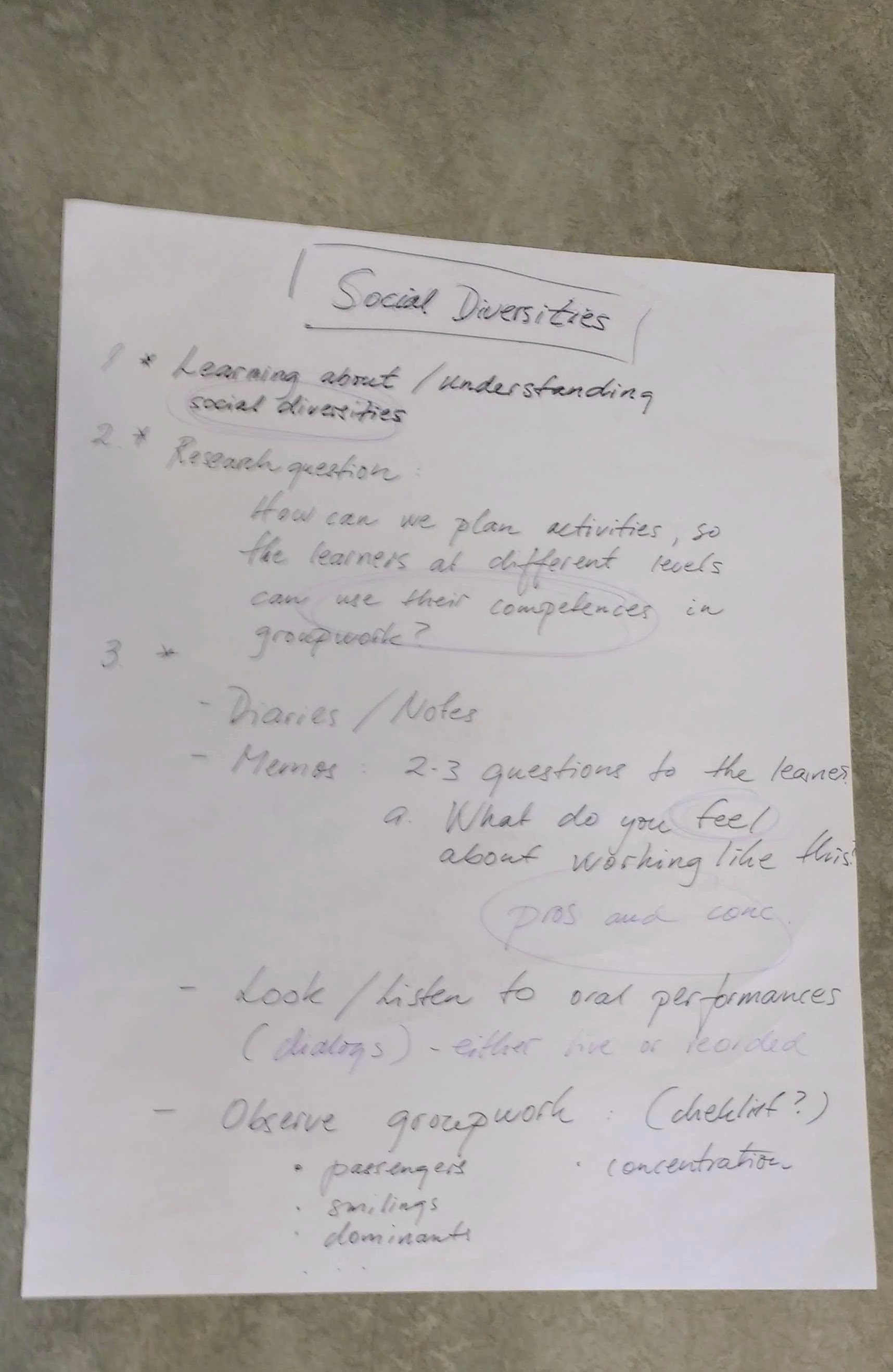

30.05.2018
Action Research Communities for language teachers: ARC Network Meeting (Graz, Austria, 3-4 May 2018)
The ARC Network Meeting was held at the European Centre for Modern Languages (ECML) on 3-4 May 2018. The event was co-ordinated by team members Angela Gallagher-Brett, Christine Lechner, Tita Mihaiu, Brynhildur Ragnarsdóttir, Anita Konrad, Marianne Jacquin and Renata Zanin and attended by 14 network members. The programme was designed around three cornerstones: presentations of action research projects developed over the past eighteen months by members of the ARC Network; input on activities around language learning and action research; discussions leading to tool development.
At the heart of the event were the network projects showing up how action research leads to expedient steps in the classroom through reflection, and these projects are to be published on the project homepage by the end of the year. Gunther Abuja from the Austrian Language Competence Centre spoke about the activities of the centre and the co-operation with the ECML; Franz Rauch from the Institute of Teaching and School Development at the University of Klagenfurt held a talk on the state-of-the-art of action research in Austria. Jim Murphy from the Centre for Distant Learning and Innovation (CDLI) in Canada spoke via skype on support for endangered languages.
The project team were extremely happy with the very constructive contributions to the tool development.
- Project website "Action research communities for language teachers" (2016-2019):
English - German
The project team:
Christine Lechner (project coordinator, Austria), Angela Gallagher-Brett (United Kingdom),
Tita Mihaiu (Romania), Brynhildur Anna Ragnarsdóttir (Iceland)
09.04.2018
"EOL - Learning environments where modern languages flourish": the network meeting (Graz, 20-21 March 2018), a key step for the ECML project
http://eol.ecml.at/
The EOL network meeting took place at the ECML in Graz on 20-21 March. The network meeting is a key step for each ECML project as it provides an opportunity to get direct feedback from different experts on tools, resources and developed approaches.
The team carefully selected the participants according to their expertise and geographical professional background. The network meeting brought together teachers from partner schools, school principals, institutional representatives and researchers. The team had also the pleasure to welcome Flore Schank, coordinator of the project Inspiring language learning and teaching in the early years, and Angela Gallagher-Bretts, team member of the project Action Research Communities.
The EOL project is in its third year of development. The concepts are consolidated, the working environment (European network, working platform, forum, etc.) is adapted to the needs. The tools have nearly all been set up, the work on resources has been launched and the research data collection is almost complete.
The drafting of the final publication, the development of the training platform, the labelling process and the dissemination activities (workshop, conference), as well as the training and consultancy offer still remain to be accomplished.
The overall structure of the network meeting was reflected in the seven steps of the EOL training path:
- Step 1: Becoming familiar with Council of Europe values, learning environments and language policies;
- Step 2: Focusing on priorities MATRIX + TrEOL game;
- Step 3: Defining strategies built on case studies per group (Matrix questions);
- Step 4: Browsing for resources;
- Step 5: Testing the masterplan;
- Step 6: Implementing EOL Online training pathways; and
- Step 7: Collaborating.
Most enjoyable was the newly designed TrEOL game; playfully being able to analyse and to discover what is needed in order to create an environment that is supporting language learning and teaching. The main components are structures, people and culture.
The network meeting gave participants the opportunity to share reflections and analyse the project through four key entries:
- modern languages as a key for human ecology (matrix);
- using the card game “TrEOL”, a symbiotic, win-win approach to considering how modern languages can help address key challenges in education;
- interconnections and their role to enhance all “synapsis” of school systems (memos, glossary, resources);
- stakeholders’ and schools’ professional development (indicators, transfer tool and training platform).
If participants support the philosophy of the EOL project and see its benefits in their own working context, there are two types of critical feedback:
- methodology: participants made proposals to make the personal and collective path on learning environments more progressive;
- strategy: participants gave several suggestions on how to improve communication on EOL and to make the different tools more easily accessible.
In the end, the main elements of the project’s dissemination are: making publications user friendly, choosing a progressive approach and selecting easy access resources. The research part and the links to other ECML projects have been deeply appreciated by participants and should find a place in the final publication. The participants’ feedback is very encouraging and gives the team a great inspiration to finalise tools and resources.
|
|
Matrix
|
TrEOL
|
Questionnaires
|
Glossary
|
Website
|
|
Relevance
|
Good
|
Excellent
|
Excellent
|
Excellent
|
Excellent
|
|
Clarity
|
Good
|
Good
|
Good
|
Excellent
|
To be improved
|
|
Innovation
|
Excellent
|
Excellent
|
Good
|
Excellent
|
To be improved
|
|
Effectiveness
|
Good
|
Excellent
|
Good
|
Excellent
|
Good
|
|
Design
|
Excellent
|
To be improved
|
Good
|
Excellent
|
To be improved
|
|
|
Memos
|
Masterplan
|
Indicators
|
Transfer
|
Platform
|
|
Relevance
|
Excellent
|
Good
|
Excellent
|
Excellent
|
Good
|
|
Clarity
|
Excellent
|
Good
|
Good
|
To be improved
|
To be improved
|
|
Innovation
|
Excellent
|
Good
|
Good
|
Good
|
Good
|
|
Effectiveness
|
Excellent
|
Good
|
Good
|
Good
|
Good
|
|
Design
|
Excellent
|
Good
|
Good
|
To be improved
|
To be improved
|
The project team:
Jonas Erin (coordinator), Kristin Brogan, Silvia Minardi, Lea Štiberc
Website of the project "Learning environments where modern languages flourish" (available in English, French and German): http://eol.ecml.at/
12.02.2018
Intense and fruitful exchange of ideas on future developments in language education
The 2-day meeting (6-7 February 2018) at the ECML in Graz, Austria, was an excellent opportunity for the ECML project experts to discuss ongoing project developments with their fellow project coordinators.
They explored synergies between the different projects and exchanged good practice in project methodology. They discussed ongoing work on the development of their products and how to best disseminate the wide range of final results which will be achieved by the end of 2018 and 2019. They reflected on critical success factors to promote the achievements across and at the end of their respective project life cycles, to implement, to mediate, to possibly further develop them and to maximise impact in the various national and individual contexts. Finally they shared initial ideas for both the contents and the structure of the next ECML programme (2020-2023). They also highlighted the added value, both professional and personal, of coordinating ECML projects, seeing this as an opportunity to bridge policy, research and practice and contribute to making a real difference to quality language education in Europe.
Impressions of the meeting (photo gallery on Facebook)
Current ECML programme of activities 2016-2019: "Languages at the heart of learning"
18.01.2018
Action research communities for language teachers (ARC): report 2017
The second project year was a year of building on the exciting progress made in 2016 and of producing the first collaborative outputs from participants’ engagement with ARC.
Action research projects started during the ARC workshop in November 2016. During the year colleagues across the ECML member states collaborated on their projects and there were intensive contacts in spring and summer. The visible result was the publication of the project abstracts on our website. Publication on the Padlet Wall continued and longer versions of the project descriptions are available there for Network partners.
Currently, we are planning the Network meeting in May 2018 and will be working together on a Moodle platform provided by the ECML.
At the same time, the project team is working on the project tools to facilitate discussions around action research to be presented, trialled and discussed at the Network meeting.
During the year there were several opportunities to disseminate the project and, at the same time, learn from ensuing discussions. ARC was presented at national workshops for language professionals in Switzerland, Iceland, Germany, Romania and Austria. There were also international conference presentations at the C.A.R.N. conference in Crete in October and the EAPRIL conference in Finland in November.
The project team is looking forward to interesting developments in 2018!
12.01.2018
Action research communities for language teachers: Expert Meeting (November 2017)
The expert meeting in November 2017 was a very good opportunity for ARC team members Angela Gallagher-Brett, Christine Lechner, Tita Mihaiu and Brynhildur Ragnarsdóttir and associate members Marianne Jacquin, Melanie Steiner and Renata Zanin to discuss further project steps and to plan the network meeting set for 3rd – 4th of May, 2018. Jim Murphy joined the meeting via Skype and David Newby supported us in a consulting role. During the meeting we also had the opportunity to visit the Austrian Languages Competence Centre (ÖSZ), where we were hosted by the Centre’s head Gunther Abuja.
The agenda for the May network meeting has been set and participants invited. Over the months leading up to the meeting participants will continue to work on action research projects to be presented at the meeting. At the meeting the project tools will be presented, trialled and completed.
The ARC team is also planning an ARC Workshop to be held in Iceland in June 2018. As in Hermannstadt/Sibiu (Romania), the focus will also be on how to lead teachers to action research and the topic theme will also be around the broad topic of intercultural learning in the language classroom.
30.11.2017
Action research communities for language teachers: ARC presentation at the Collaborative Action Research Network (CARN) annual conference at the University of Crete, 20-22 October 2017
Two members of the ECML’s Action research communities for language teachers (ARC) team from Austria and the United Kingdom attended the annual CARN conference at the University of Crete, Greece in October 2017 and presented on the latest developments in the ARC project.
We set out the aims and objectives of the project to conference participants who were mostly representatives from tertiary education from across Europe and beyond although there were also some local school teachers and students from Greek universities. We reported on the progress of all our language teachers and teacher educators from ECML countries who have been conducting collaborative action research projects in language teaching contexts across national and linguistic boundaries. The projects seemed to generate significant interest among members of our audience who also raised relevant and thought-provoking questions for us to consider as we move forward to the next phase of ARC.
The conference was a highly enjoyable event in a wonderful setting and provided us with a great opportunity to engage with action researchers from education and health working in a diverse range of contexts.
The project team:
Christine Lechner (project coordinator, Austria), Angela Gallagher-Brett (United Kingdom), Tita Mihaiu (Romania), Brynhildur Anna Ragnarsdóttir (Iceland)
12.09.2017
Symposium celebrating the 10th anniversary of the Austrian Society for Languages Didactics: presentation of the project "Action research communities for language teachers"
On the 19 May 2017 Christine Lechner and Renata Scaratti-Zanin had the opportunity to attend the Symposium to celebrate the 10th anniversary of the Austrian Society for Languages Didactics and to present the ARC project ("Action research communities for language teachers") there. The lively and very intensive symposium hosted by the University of Vienna was attended by over 80 researchers, teachers and teacher educators as well as representatives from educational authorities and publishing houses from Austria, Germany, Italy and Hungary. The long abstract (*) on the ARC project (pp. 60-64) is included in the conference proceedings and describes the project framework, steps taken so far as well as the results from the workshop projects and ongoing developments.
(*) Available in German
Christine Lechner, project coordinator
09.05.2017
Action Research: 10 projects ongoing and new tools to be developed
The third ARC team meeting took place on the 6th and 7th of April, 2017. The aims of the meeting were to consolidate the work of the first year and to plan for the second part of the project.
The meeting provided the opportunity to discuss the results of the workshop held at the beginning of November 2016 and especially to look at the evolving Action Research projects planned there. We were extremely pleased that ten project reports have now been submitted and that the majority of the participants are still involved. A summary of the projects is soon to be published on the project homepage.
From the results of the workshop we were able to move on to the design of action research tools, which will be trialed over the next few months. At the network meeting to be held on the 3rd and 4th of May, 2018 this work will be presented and 14 participants of the workshop will be invited back to the network meeting to present the results of their ongoing action research.
19.04.2017
ARC Presentation (Action research communities for language teachers) at the C.A.R.N. (Collaborative Action Research Network) D.A.CH Symposium in Linz
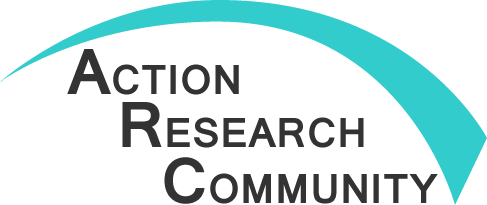
ARC Presentation (Action research communities for language teachers) at the C.A.R.N. (Collaborative Action Research Network) D.A.CH Symposium in Linz
Three members of the ARC team from Austria and South Tyrol attended the symposium organised by the German-language branch Collaborated Action Research Network held in Linz in Upper Austria at the beginning of January, 2017.
Through the presentation we had the opportunity to explain the specific aims of the ARC Project to a public well informed about action research but mostly working in fields other than languages. We also had the opportunity to explain the project framework and introduce the ECML to colleagues from other fields.
On the one hand, we were able to report on the development of a trialled template for a three-day workshop on action research “for beginners” as held in Sibiu/Hermannstadt, Romania in October 2016.
On the other hand, we reported on the exciting collaborate action research projects currently being developed across the ECML countries as the result of the November 2016 workshop held at the ECML in Graz.
- Does an explicit focus on critical thinking skills in our lesson planning and instruction enable students to engage in critical thinking? (with project partners from Albania, Netherlands, Malta, Latvia)
- How can pupils’ language skills be enhanced by using news media and Facebook sharing in language teaching? (with project partners from Croatia and Iceland)
- Breaking barriers: Can we identify barriers for professional learning English as a second language at university level? (with project partners from Armenia and France)
- What is the role of the teacher in university student-centered activities? (with project partners from Finland and France)
- How does teaching vocabulary learning strategies contribute to learner autonomy in CLIL & modern foreign language classrooms? (Ireland)
- Wie kann erreicht werden, dass die Kinder im Unterricht in der Zielsprache Deutsch sprechen? (with project partners from Liechtenstein, Lithuania and Romania)
- Using the European Portfolio for Student Teachers of Languages (EPOSTL) as a self-reflection tool for improving pre- and in-service teachers’ competences. (with project partners from Bosnia and Herzegovina, Estonia and Greece)
- Challenges of CLIL teachers
Intercultural competences through a student- based project. (with project partners from the Czech Republic and Poland)
- CLIL in secondary vocational schools seen through students’ perspectives. (with project partners from “The former Yugoslav Republic of Macedonia” and Serbia)
- Intercultural Competences through a student-based project. (with project partners from Austria, Denmark and Montenegro)
- Lehrerrolle als Ko-Konstrukteur von Wissen (with project partners from Bulgaria Switzerland, Germany, Norway and Slovenia)
During the symposium a number of collaborate action research projects from various fields were presented and the ARC project fitted well into the framework. Our approach working together across Europe on a common action research project that is implemented in completely different national contexts is of innovative character.
Although C.A.R.N. is a well established network with roots in the 1970’s, the German-language branch is relatively new and currently undergoing a dynamic phase of growth and development. The symposium was an enjoyable event characterised by a supportive atmosphere in which all participants had the opportunity to learn from each other about different professional contexts.
20.03.2017
Action Research for Language Teachers : project developments
The ECML project entitled “Action Research Communities for language teachers” aims to make techniques for action research widely available to language teachers across Europe by establishing a community of practice which brings together newly qualified and experienced teachers with teacher educators and university researchers. The project will strengthen professional language teaching networks by forging links between academic expertise on action research and good practice in language classrooms. Language teachers will be able to benefit from improved access to action research and to a diverse range of perspectives on teaching methodologies. In addition, this project will provide opportunities for language teachers to reflect on practice and to propose and test innovations while working collaboratively within a community of practice.
The project has just completed an exciting and successful first year, which began with an initial planning meeting of the project team in Graz in February 2016. This was followed by the first project workshop at the Pedagogical University Tirol in Innsbruck during the International Week in April 2016 where broad-ranging discussions on quality and enhancement in teaching at tertiary level across Europe took place. The workshop was held in conjunction with the coordinator of “Towards a Common Framework of Reference for Language teachers”. We then organised an action research workshop for German teachers in Sibiu/Hermannstadt (Romania) in October 2016 which introduced the participating teachers to action research tools and provided them with the opportunity to plan and develop collaborative action research projects to be carried out in their own classrooms. The teachers are currently trialling the lessons and writing reports on the action research process. Finally, a workshop for teachers and teacher trainers/educators from across Europe was held in Graz in November 2016. Here participants shared inspiring stories and examples from their own teaching, reflected on action research approaches in different European contexts and also gained an insight from a Canadian expert into the vital contribution of distance and online language teaching in providing access to languages for rural communities. Participants subsequently identified their own action research interests and formulated collaborative group proposals for a set of pilot classroom projects. Groups are responsible for reporting on their projects in March 2017. The workshop was greatly enjoyed and we look forward to seeing and disseminating the outcomes of this work. It is already clear that an impressive level of activity is underway and that the collaborative approach is benefitting those teachers who are relative newcomers to action research.
The project team will now move on to exploring and developing synergies and links with other ECML projects and will be producing a set of guidelines for action research networking strategies and formats for training courses to improve classroom practice by linking quality strategies to practical action research approaches. Ultimately, project outcomes will include the production of action research tools which help to improve the quality of language teaching and foster dialogue between teachers in different sectors and evidence which shows the reciprocal relationship between practice and research. We also hope to demonstrate the benefits of action research to teachers and learners by creating a set of success stories in different languages and to create European models for peer learning activities which can be implemented at school/national level.
The team of the project “Action research communities for language teachers” (2016-2019):
- Christine LECHNER, Coordinator, Pedagogical University Tirol - Pädagogische Hochschule Tirol (PHT),
- Brynhildur Anna RAGNARSDOTTIR, Website correspondent, Language Studio in Laugalækjarskóli,
- Mihaiu TITA, Second language documentalist, Centrul pentru formarea Continua in Limba Germana (CPD)
- Angela GALLAGHER-BRETT , Communications person, SOAS, University of London
*****
German version
Aktionsforschungsnetzwerke für SprachenlehrerInnen - ARC:
Ein EFSZ-Projekt
Das Projekt „Aktionsforschungsnetzwerke für SprachenlehrerInnen“ setzt sich als Ziel, Techniken der Aktionsforschung für SprachlehrerInnen in ganz Europa zugänglich zu machen. In diesem Sinn soll sowohl JunglehrerInnen als auch erfahrenen LehrerInnen und FortbildnerInnen die Möglichkeit zum praktischen Austausch geboten werden.
Das Projekt möchte die existierenden Sprachunterrichtsnetzwerke stärken, indem es Verbindungen zwischen akademischem Fachwissen über Aktionsforschung und bewährter Praxis im Sprachunterricht herstellt.
SprachlehrerInnen können von einem verbesserten Zugang zu Aktionsforschung und einem breiten Spektrum an Lehrmethoden profitieren. Darüber hinaus bietet dieses Projekt durch die Vernetzung der SprachlehrerInnen die Möglichkeit, über die Praxis nachzudenken und Innovationen vorzuschlagen und zu testen.
Zu diesem Zeitpunkt können wir über ein spannendes und erfolgreiches erstes Projektjahr berichten: Begonnen hat es mit der ersten Planungssitzung des Projektteams in Graz im Februar 2016, auf das im April der erste Projektworkshop im Rahmen der „International Week“ an der Pädagogischen Hochschule Tirol in Innsbruck folgte. Hier gab es breit gefächerte Diskussionen über die europaweite Qualität und Verbesserung des Unterrichts im tertiären Bereich. Der Workshop wurde in Zusammenarbeit mit dem Koordinator des EFSZ-Projektes „Towards a Common Framework of Reference for Language teachers“ gehalten.
Als Nächstes haben wir einen Aktionsforschungsworkshop für LehrerInnen aus Sibiu/Rumänien im Oktober 2016 organsiert, der den teilnehmenden Lehrpersonen den Zugang zu Instrumenten der Aktionsforschung erschlossen hat und ihnen die Möglichkeit gab, kollaborative Aktionsforschungsprojekte für den Unterricht auszuarbeiten. Die LehrerInnen sind dabei, diese umzusetzen und ihre Berichte dazu zu verfassen.
Schließlich fand im November in Graz ein Workshop für LehrerInnen und FortbildnerInnen aus ganz Europa statt. Hier hatten die TeilnehmerInnen die Möglichkeit, inspirierende Geschichten und Beispiele aus der eigenen Praxis auszutauschen und unterschiedliche Ansätze der Aktionsforschung aus verschiedenen europäischen Kontexten kennenzulernen. Ein kanadischer Experte vermittelte den TeilnehmerInnen einen Einblick in die Wichtigkeit des Online-Sprachenlernens in schwer erreichbaren, ländlichen Regionen. TeilnehmerInnen haben in der Folge Ihre eigenen Aktionsforschungsinteressen abgesteckt und Vorschläge für Gruppenarbeit für Pilotierungsprojekte für den Unterricht erarbeitet. Rückmeldungen aus den Gruppen werden für März 2017 erwartet. Der Workshop war für alle Beteiligten sehr bereichernd und wir freuen uns schon auf die Sichtung und Dissemination der Ergebnisse. Bereits jetzt zeigt sich, dass eine beachtliche Fülle von Aktivitäten in Gang gesetzt wurde. Der kollaborative Ansatz ist auf jeden Fall ein bedeutender Vorteil für jene LehrerInnen, die gerade erst begonnen haben, sich mit Aktionsforschung zu beschäftigen.
Das Projektteam wird sich nun auf die Erforschung und Entwicklung von Kontakten und Synergien mit anderen EFSZ-Projekten konzentrieren und an einem Handbuch für netzwerkorientierte Strategien der Aktionsforschung arbeiten. Es werden Fortbildungsformate entwickelt werden, die zur Verbesserung der Unterrichtspraxis führen können und bei denen Qualitätsstrategien mit Ansätzen aus der Aktionsforschung verknüpft werden.
Schließlich werden als Ergebnis des Projekts Instrumente für die Aktionsforschung geschaffen und veröffentlicht, die dazu beitragen, die Qualität des Sprachunterrichts zu verbessern, den Dialog zwischen LehrerInnen in verschiedenen Sektoren zu fördern und das Wechselspiel zwischen Praxis und Forschung zu verdeutlichen. Mit Hilfe einer Sammlung von erfolgreichen Projekten in verschiedenen Sprachen werden wir versuchen, die Vorteile von Aktionforschung für LehrerInnen und LernerInnen zu belegen und ein europäisches Modell für kollegiales Lernen zu entwickeln, das im Schulbereich oder auf nationaler Ebene eingesetzt werden kann.
Das Projekttteam “Aktionsforschungsnetzwerke für SprachenlehrerInnen” (2016-2019):
- Christine LECHNER, Koordinatorin, Pädagogische Hochschule Tirol (PHT),
- Brynhildur Anna RAGNARSDOTTIR, Verantwortliche für die Webseite, Language Studio in Laugalækjarskóli,
- Mihaiu TITA, Verantwortliche für die zweite Projektsprache, Centrul pentru formarea Continua in Limba Germana (CPD)
- Angela GALLAGHER-BRETT , Verantwortliche Kommunikation, SOAS, University of London
05.01.2017
Just published: European Language Gazette no. 35 (December 2016)
The ECML's e-newsletter provides up-to-date news about the ECML (events, projects, resources), its partners and other relevant sectors of the Council of Europe. It focuses on language education and national developments in the member states and beyond.
Enjoy the latest issue (December 2016) : English - French
13.12.2016
Action Research Communities for Language Teachers workshop (Graz, 10-11 November 2016): workshop news
The Action Research Communities for Language Teachers workshop was held at the ECML in Graz on the 10-11 November 2016 run by the ARC team - Christine Lechner, Angela Gallagher-Brett, Tita Mihaiu, Brynhildur Ragnarsdóttir, Renata Zanin & Jim Murphy. We were very pleased to welcome 31 participants from the ECML member states.
The workshop was the first open event of the project and as such the aims were to open the project and invite participants to join us in developments. Discussions on action research as a way to enhance quality in education were opened through activities such as an analytic discourse, a dialogue sheet to initiate discussions about quality in education, an action-research city walk. There was input on action research in national contexts as well as on distance learning.
The results of the workshop are mini-action research projects that are currently being trialled across the ECML member states with final reports expected for the Spring. We are very much looking forward to exciting mini-action research project results.
Interesting completed projects will be published on the project website and the most successful presented at the Network Meeting to be held on 3-4 of May 2018.
Authors: the ARC project team
*****
GERMAN VERSION
Der Workshop des Projektes „Aktionsforschungsnetzwerke für SprachenlehrerInnen“ fand von 10. bis 11. November 2016 statt und wurde vom ARC-Team (Christine Lechner, Angela Gallagher-Brett, Tita Mihaiu, Brynhildur Ragnarsdóttir, Renata Zanin und Jim Murphy) geleitet. Am Workshop haben 31 SprachenlehrerInnen aus den EFSZ-Mitgliedsstaaten teilgenommen.
Der Workshop war die erste große Veranstaltung des Projekts und diente der Bekanntmachung der Projektideen. Die TeilnehmerInnen wurden eingeladen, uns in unserem Vorhaben zu unterstützen. Die Diskussion über Aktionsforschung als ein Weg zur Qualitätssicherung im Bildungswesen wurde angeregt durch Aktivitäten wie Analysegespräche, ein Dialogblatt als Hinführung zum Thema „Bildungsqualität“ oder ein Aktionsforschungs-Stadtspaziergang.
Auf dem Programm standen Präsentationen zum Einsatz von Aktionsforschung in nationalen Kontexten und zu Formen des Sprachenlernens im Fernunterricht.
Die Ergebnisse des Workshops sind Mini-Aktionsforschungs-Projekte, die nun in Kleingruppen in den EFSZ-Mitgliedsstaaten durchgeführt werden und für die im Frühling ein Endbericht seitens der TeilnehmerInnen zusammengestellt wird. Wir freuen uns sehr auf spannende Mini-Aktionforschungs-Ergebnisse.
Interessante Mini-Projekte werden auf der Webseite des Projektes zugänglich sein und das erfolgreichste Projekt wird beim Netzwerktreffen am 3. und 4. Mai 2018 vorgestellt.
Das Projektteam